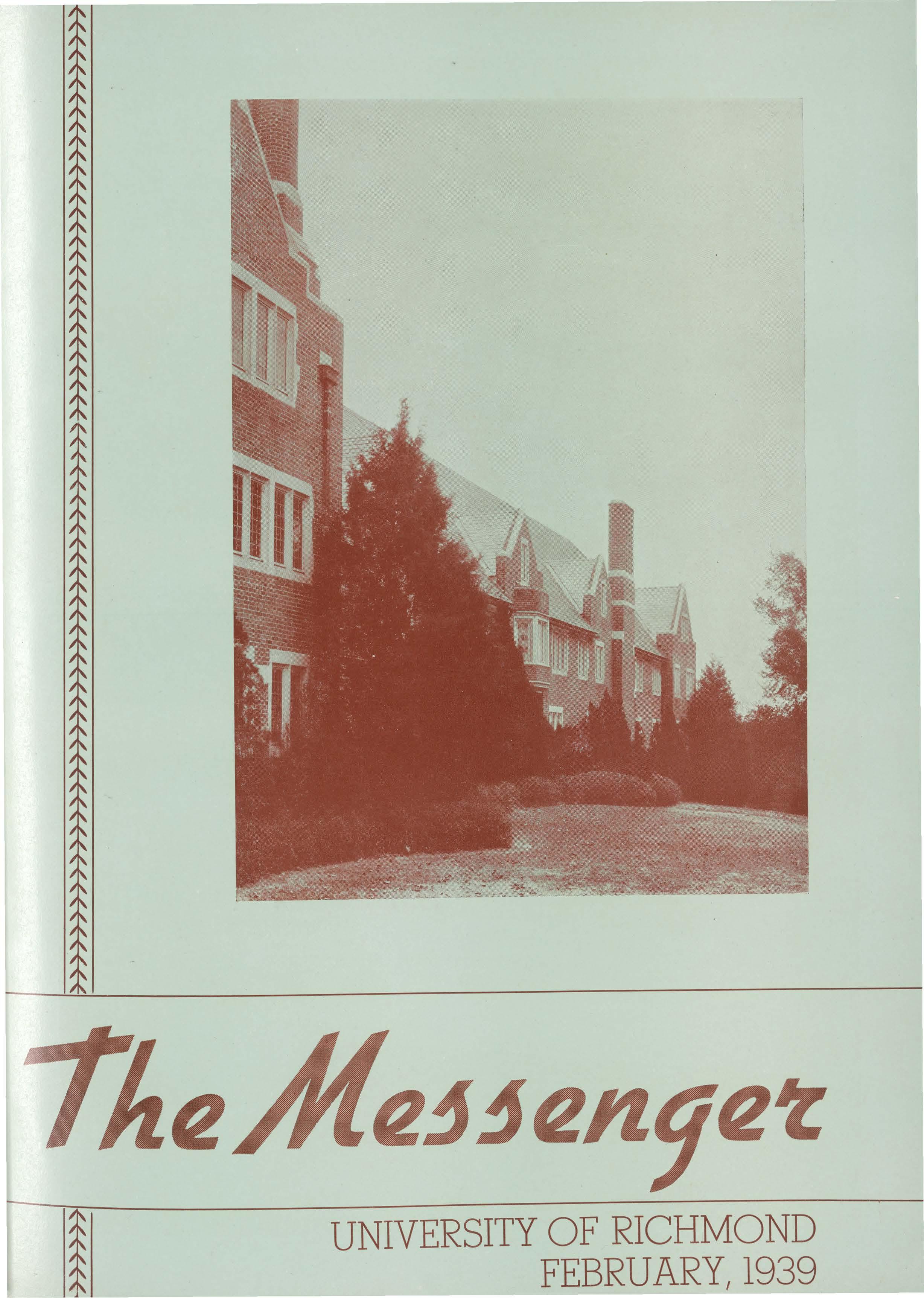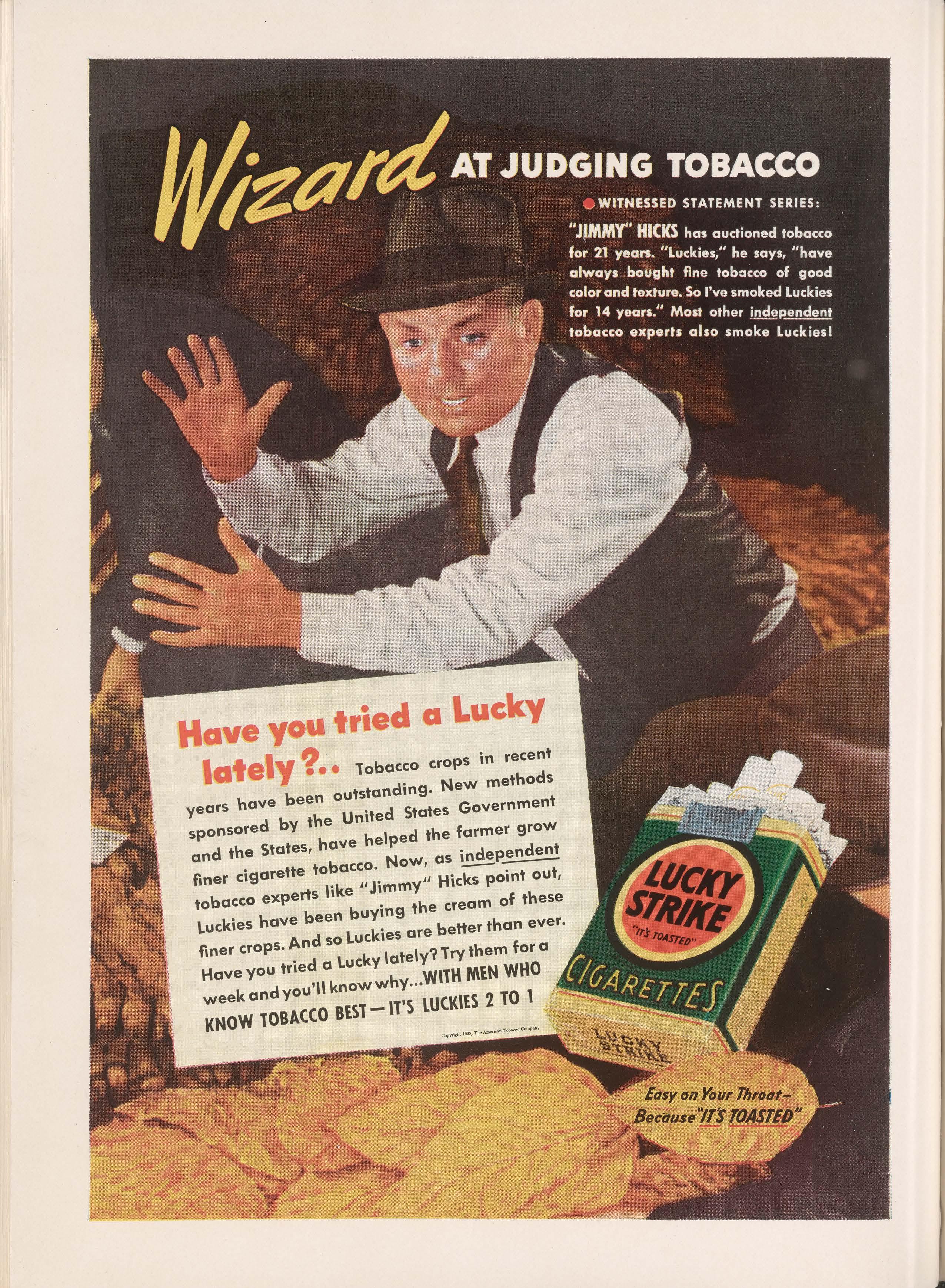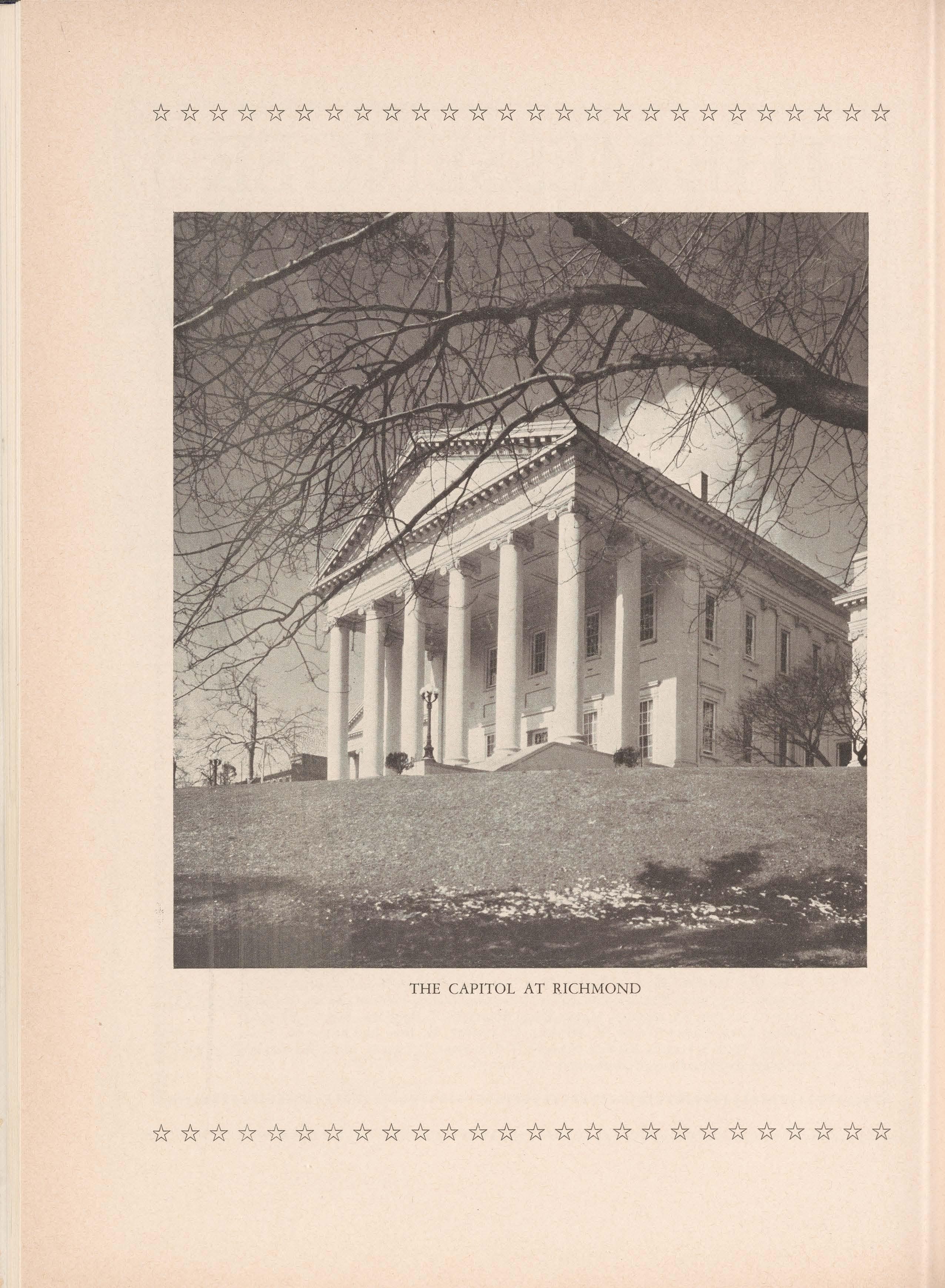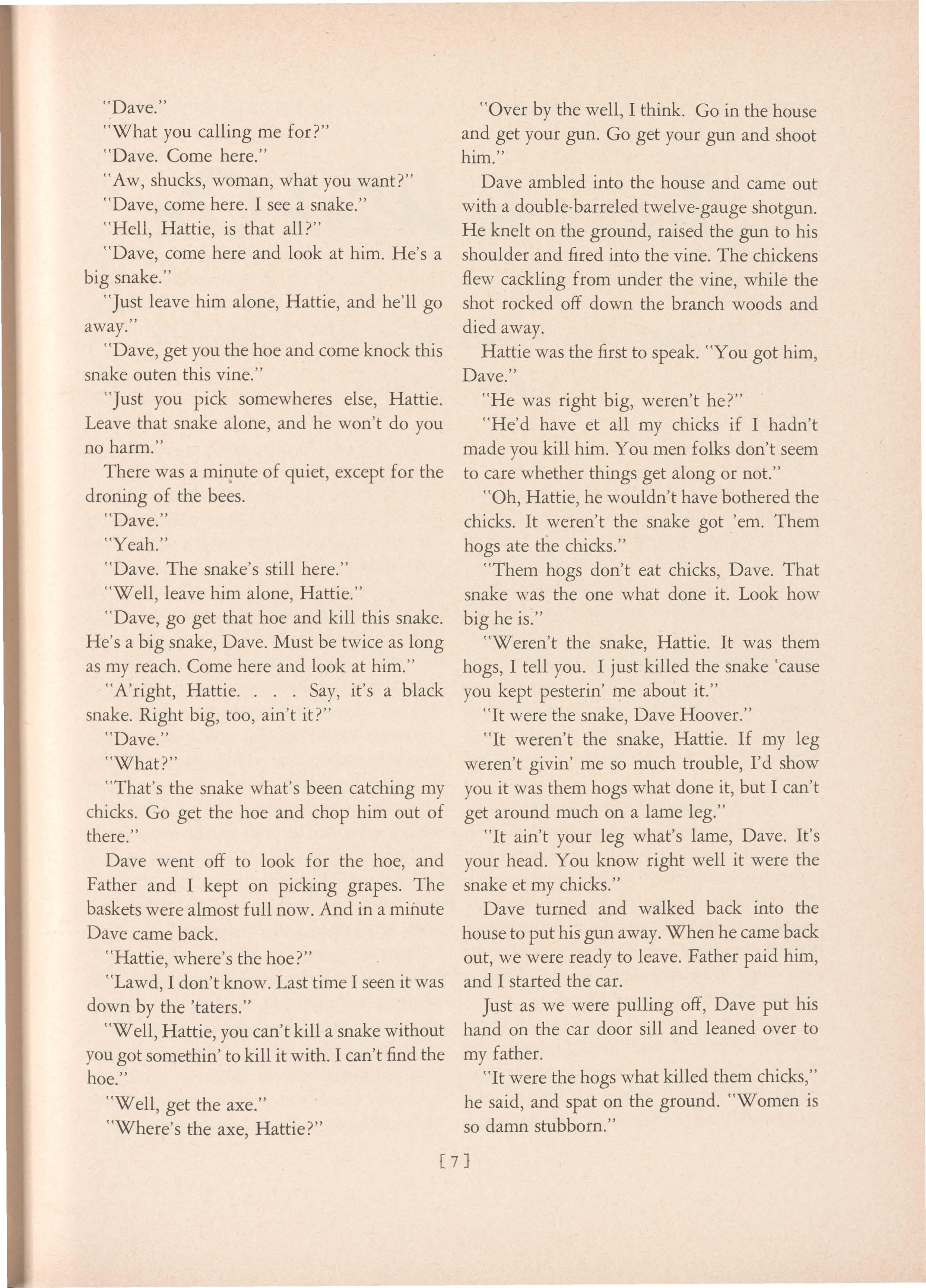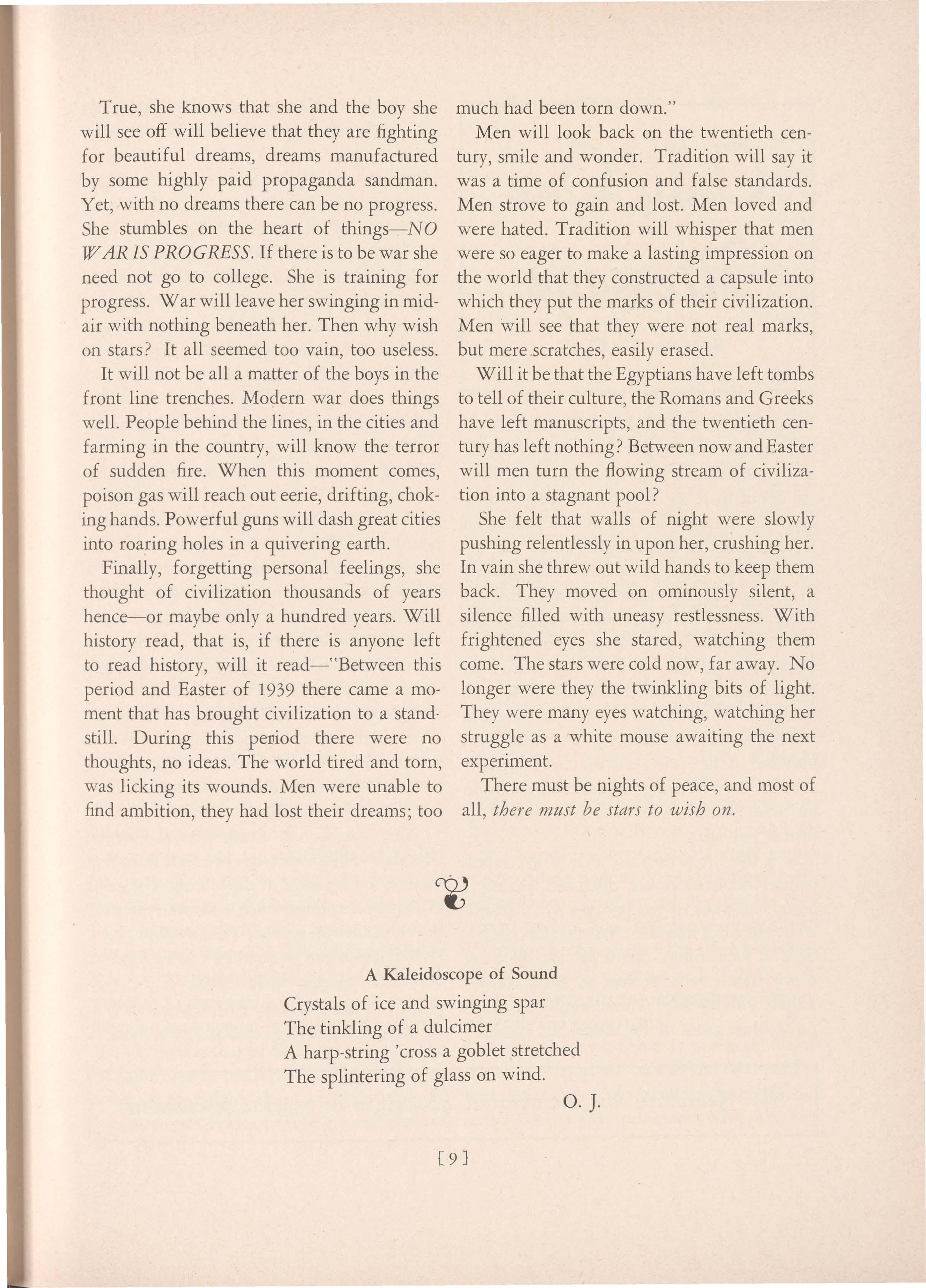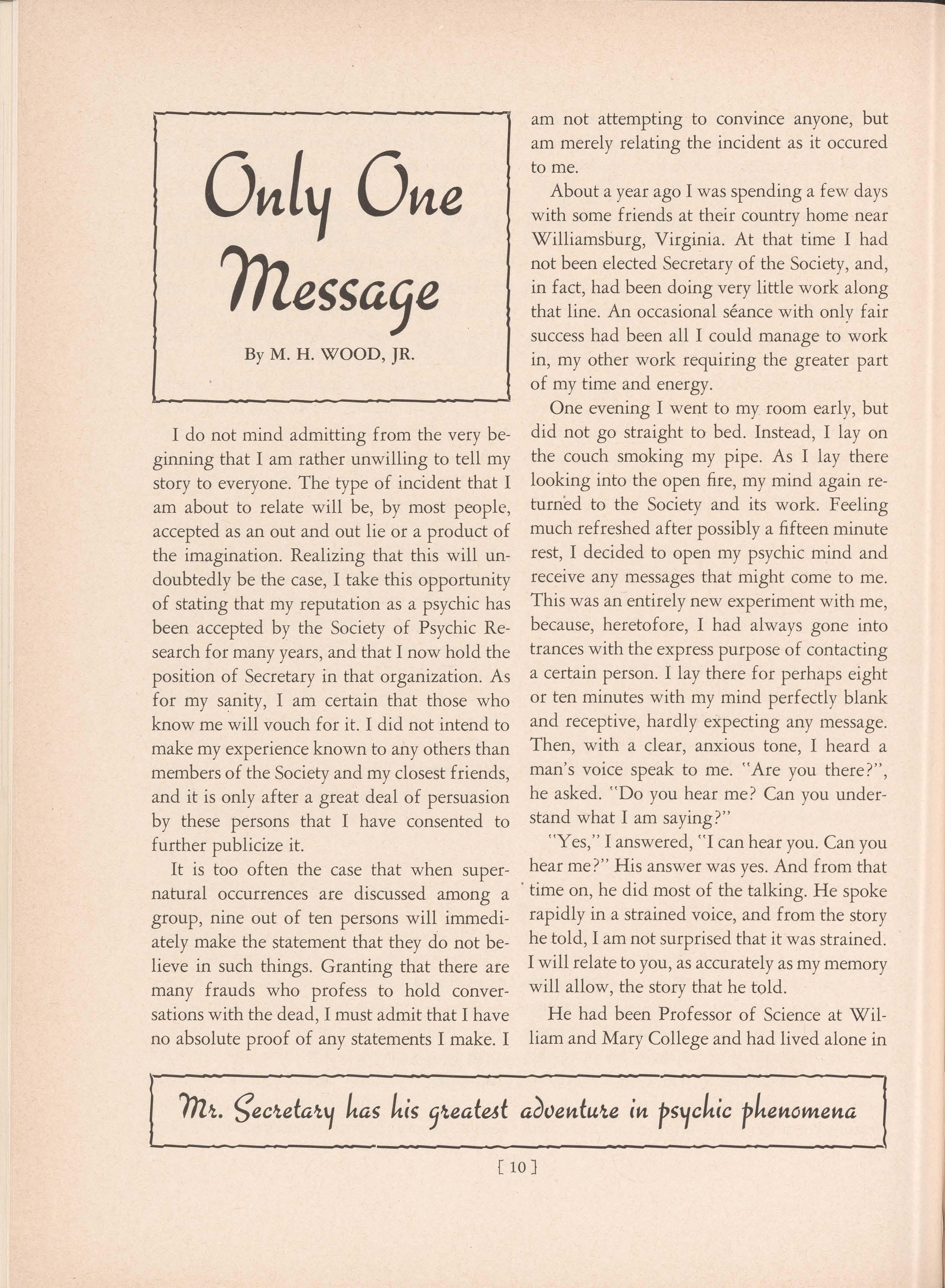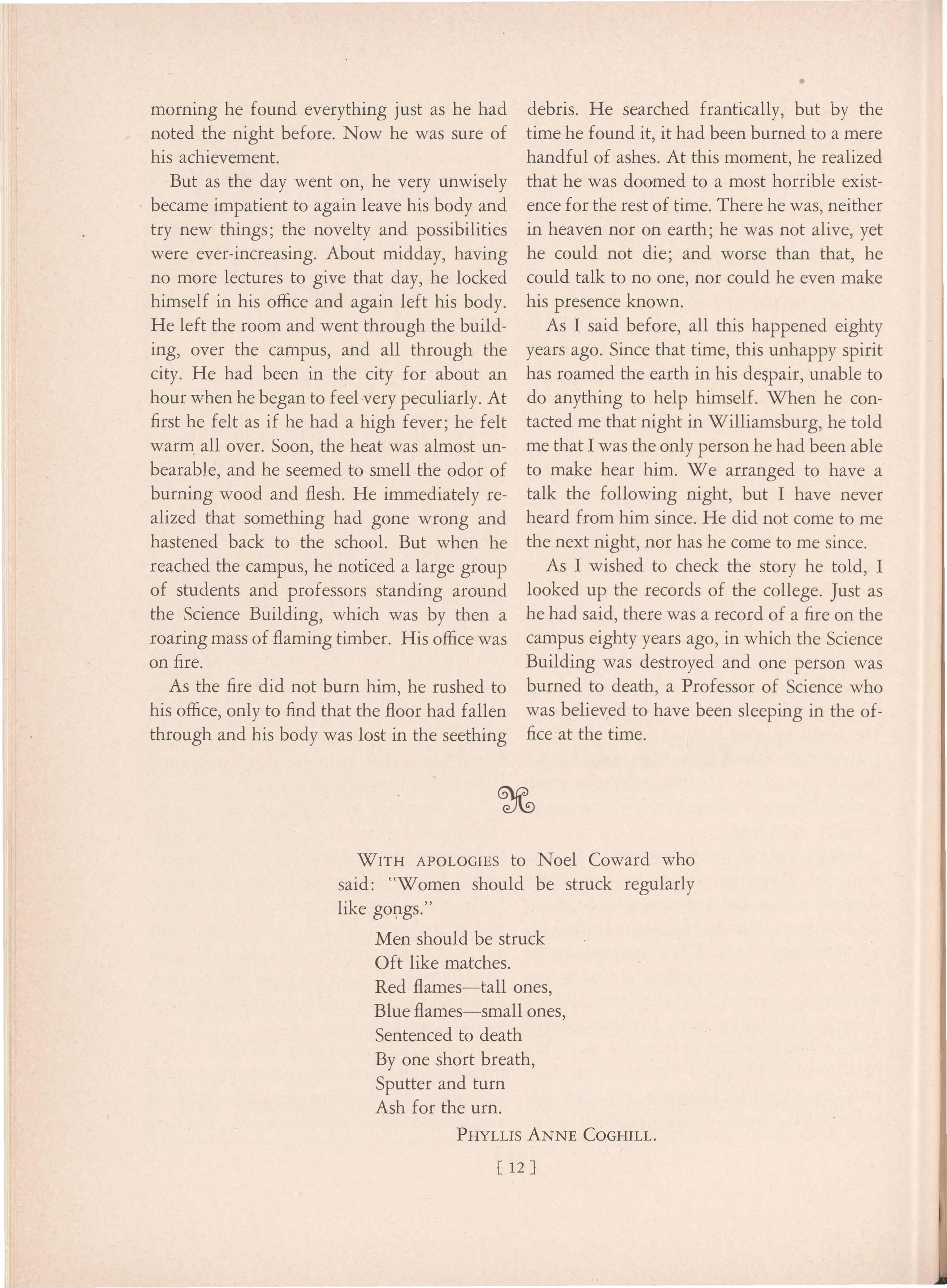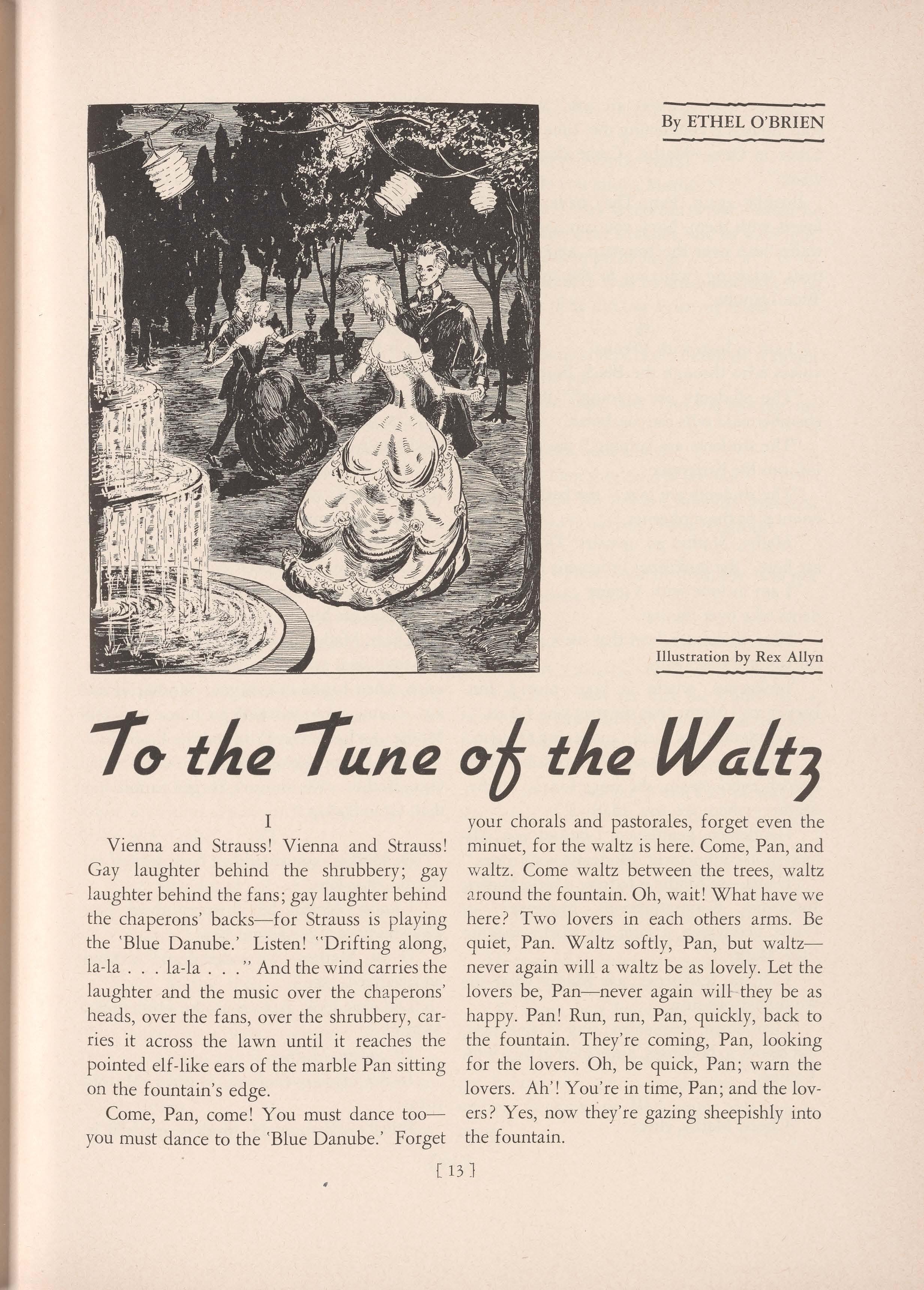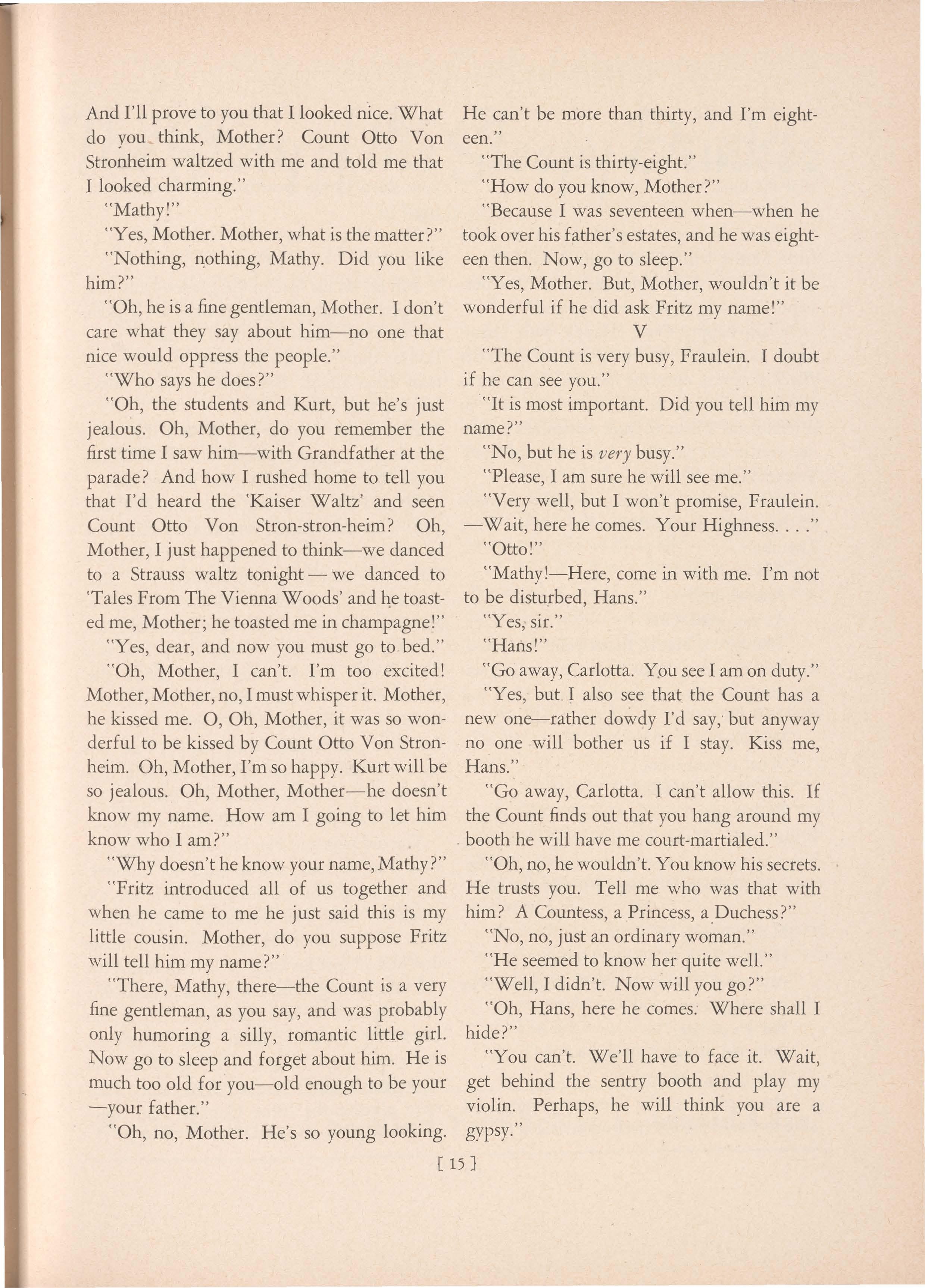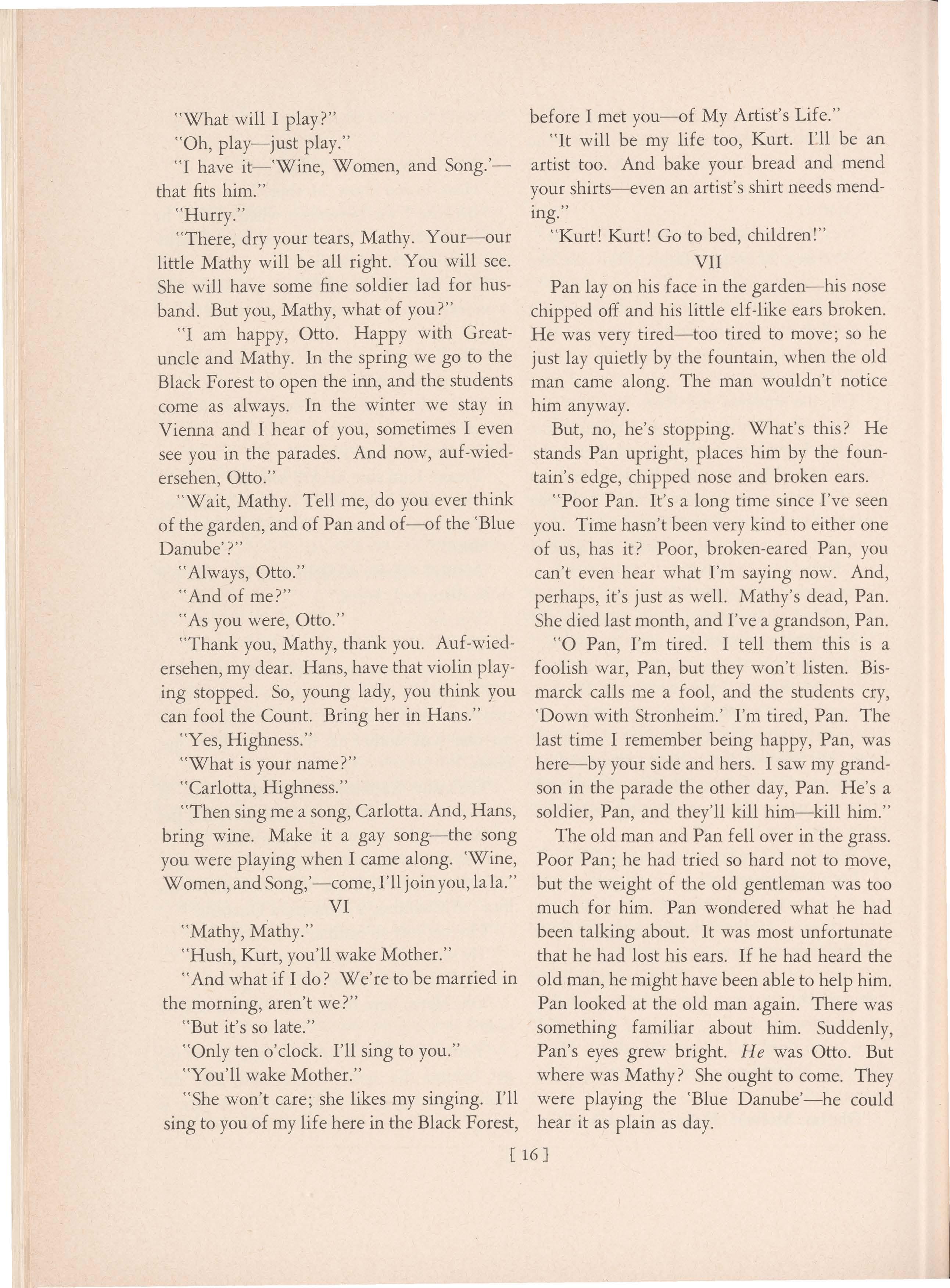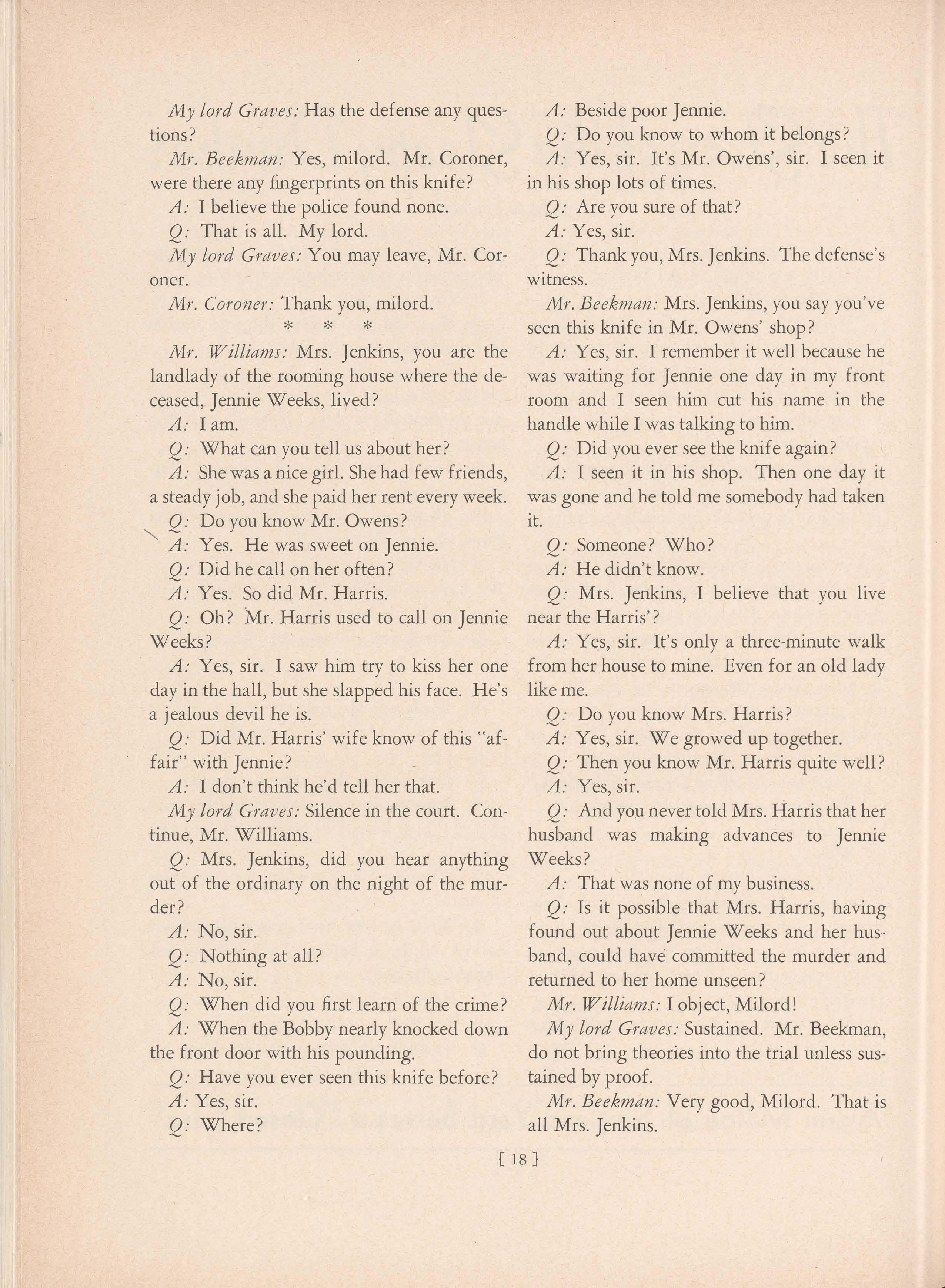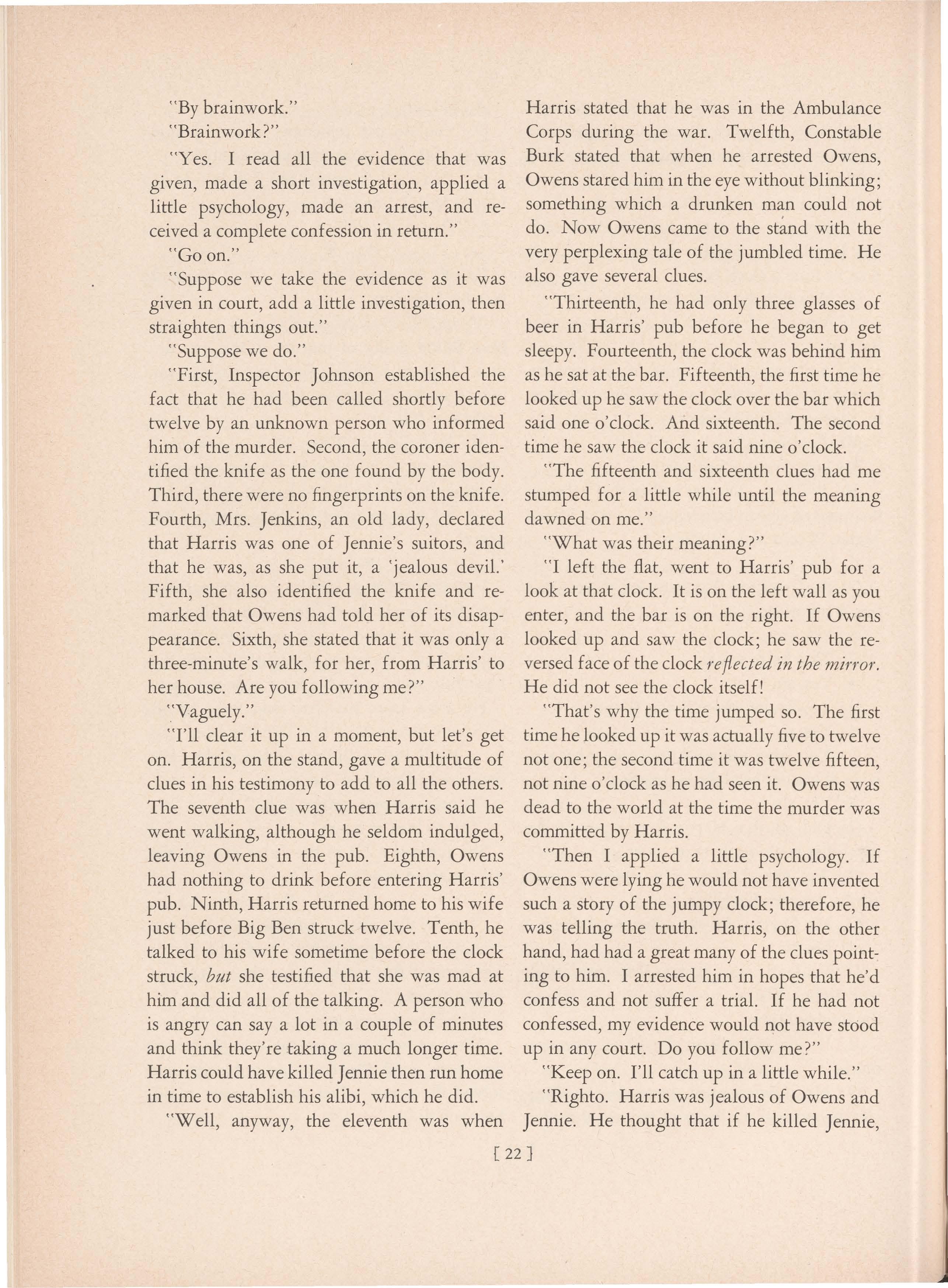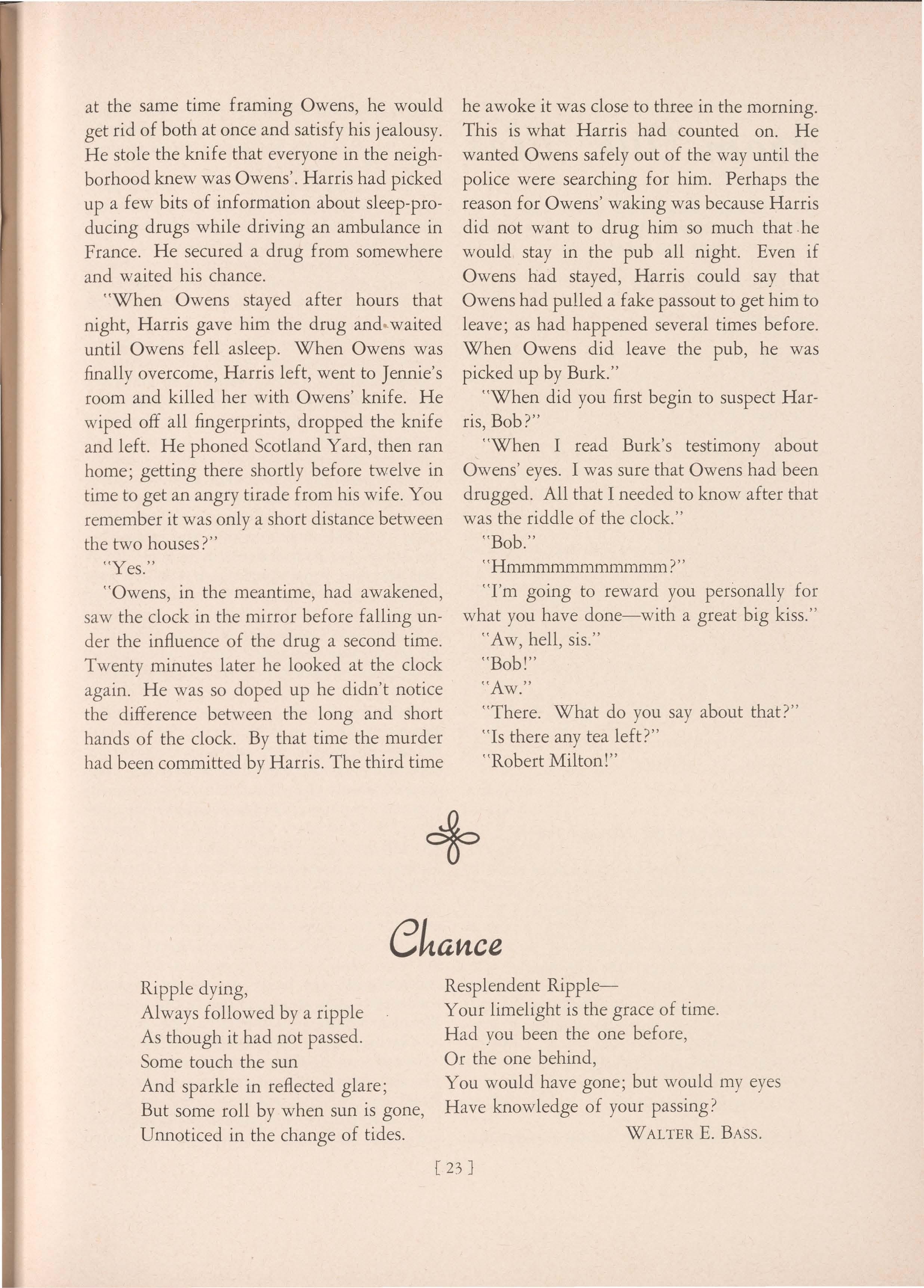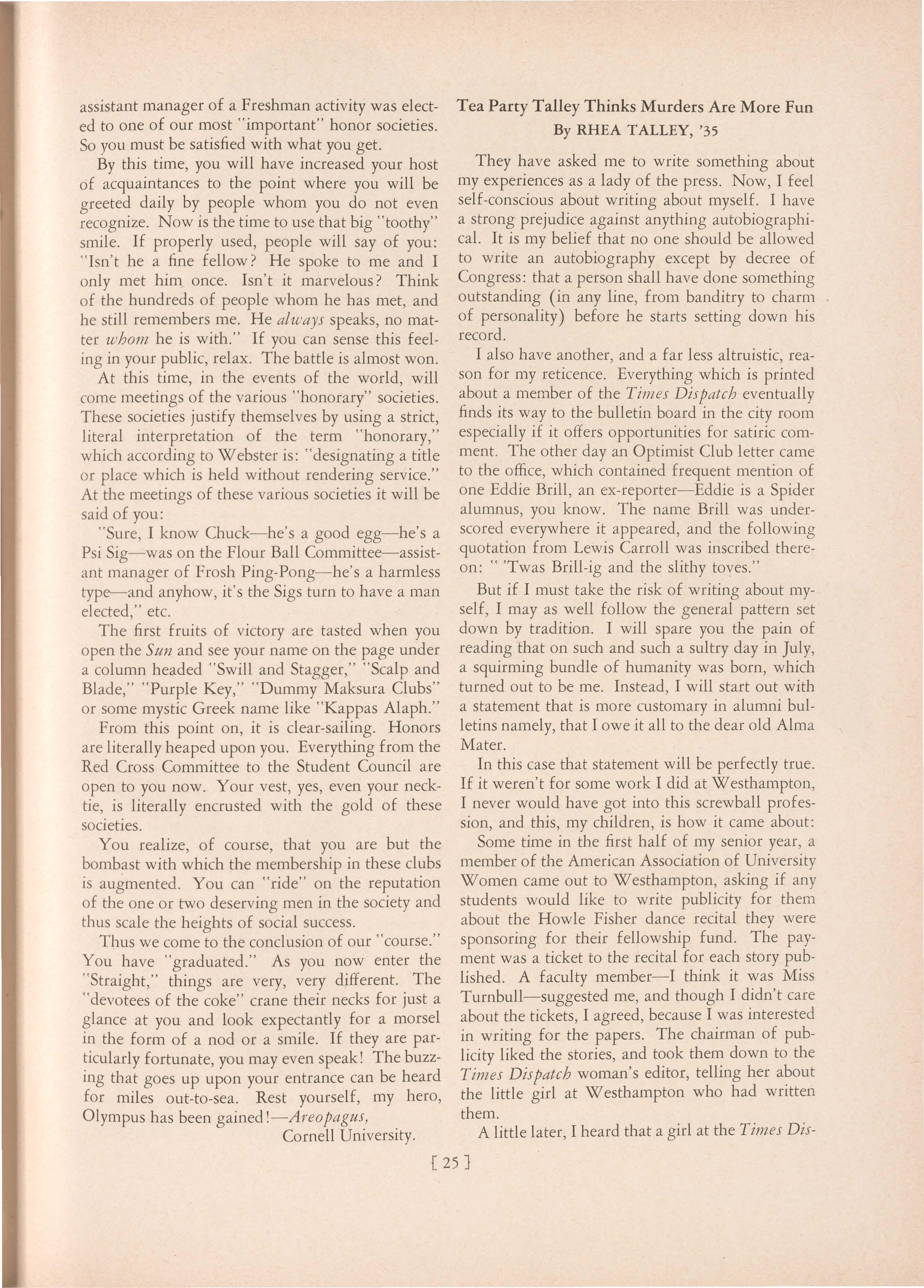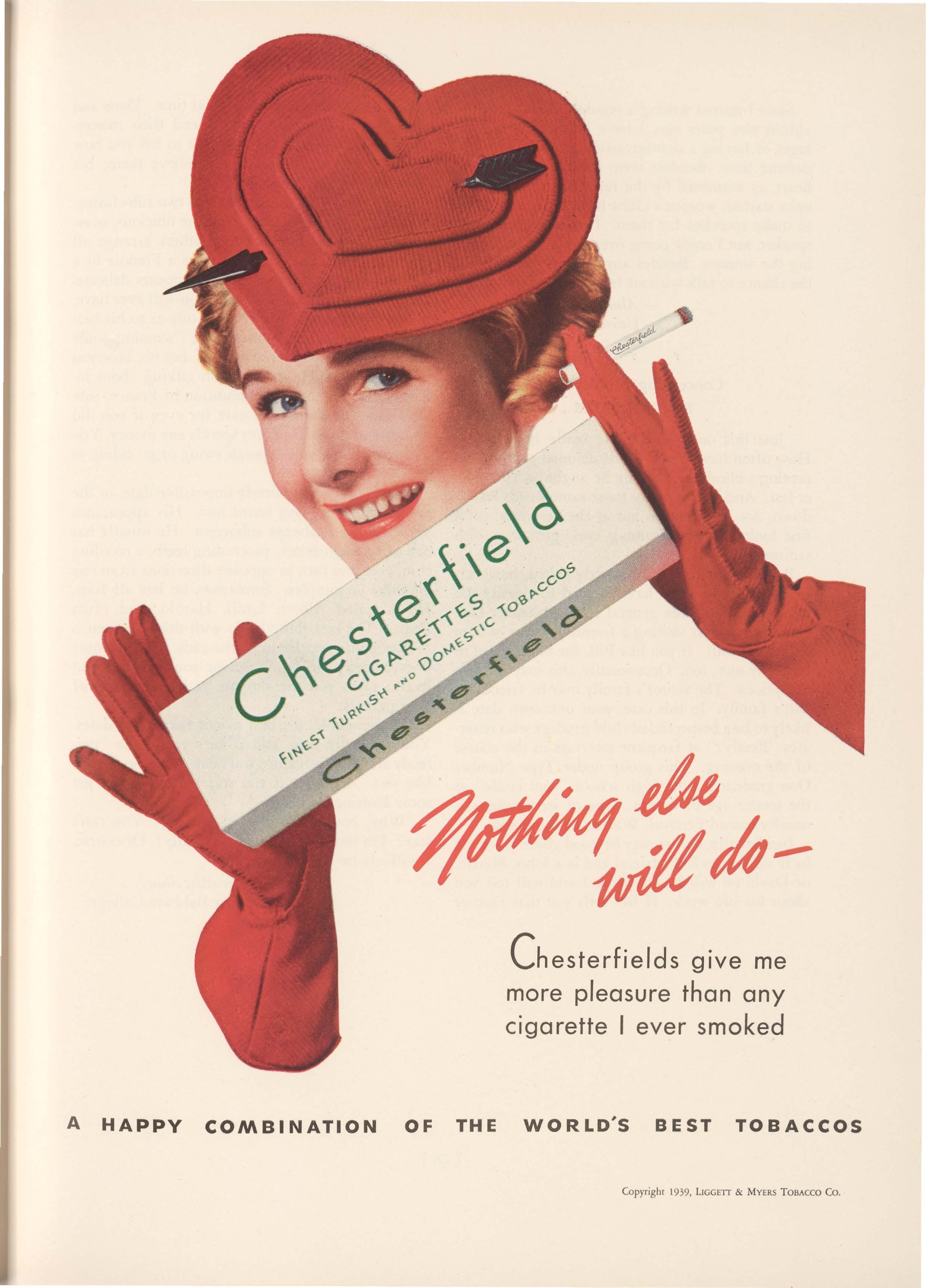quakeiu 1lieViue
By WILLIAM L. MANER, Jr.
There isn't another place like Shady Grove in the whole state. You w ouldn ' t think you'd find people like those in Shady Gro v e livin g so close to railroads and highways, but there the y are, and there they have been since the Revolutionary War. Shady Grove isn't set off by any particular landmarks, but once you get on the other side of the Seaboard tracks from the river you can tell the difference. You don't see the dark, wet earth up in this part of the county that you see along the river. It's grey and sandy and dry. The ground has just worn itself out, trying to support a little cotton year in and year out, and the people who tenant the

Dave ' s house is a three-room clapboard cabin, old and grey, and has never seen a coat of paint. There isn't any glass in the windows, just a big shutter for each one He kept the shutters open all summer and closed up when it got cold . Grey cotton curtains, once white, hung listlessly outside the windows, turning slightly every time the breeze stirred them. A homemade cotton mattress hung over the edge of the front porch, and a brown and black hound sniffed at us from the coolness under the porch.
I stopped the car under a chinaberry tree and Father got out.
In front of the house was a round bed of wilted zinnias , circled by Coca-cola bottles and bricks half-buried in the dirt. Dave's wife, Hattie, was sweeping the dirt in front of the house with an oak branch broom when we drove up.
She was a thin , bent woman with a sharp, narrow face, almost hidden by the enormous faded pink sunbonnet. She was wearing a threadbare blue and white gingham dress and heavy men's work shoes, several sizes too large.
[ 5 }
Father stepped around the dried flowers. "Good evening, Mrs. Hoover. Dave around?"
"Yessuh. He's up there on the porch, takin' a nap," Hattie said, swatting at the hound with her broom. "Dave," she called. "You, Dave. Here's Mr. Bob out here to see you."
Something stirred on the porch, and Dave climbed jerkily from the floor, where he had been dozing. He picked up his battered straw hat and hobbled slowly down the steps.
"Hello, Mr. Bob. Is you heard anything 'bout the election yet? Mr. John were up here last of last week. He said he's going to put us all on WP A pensions. Y estiddy, his boy came up here and took me and Joe Best's boy over to Manuel's to vote."
"Well, the last thing I heard, he was a little ahead of the rest. Ellis carried Martin's station and all that part up there, of course. But he didn't get much in the rest of the county How've you been, Dave?"
"Not so well, Mr. Bob. Not so well. I've had a good deal of misery in my leg lately. It don't look like I can do nothing. I can't work, and it don't look like the government lady will give you nothing. I wanted to go over the branch this morning to look at that cotton, but my leg hurt me so bad I just had to set down here on the porch and rest."
"That's what I came up here about," Father told him. "That cotton's about ready to pick, and I wanted to find out how many niggers you had got to help you pick. I'd like to get it picked as soon as possible."
"Mr. Bob, I intended to see about that last week, but my leg just been bothering me so . . . " He spat at a chicken scratching around his feet. "That Jackson nigger's oldest boy was by here the day before yestiddy, and I asked him when him and his folks would be ready to start picking, and he said they was already picking for Mr. Manuel and wouldn't be through for 'bout two weeks."
[6]
And so the talk went on. Hoover complained and excused; Father looked grim and tried to figure out a way to get the cotton picked. It didn't do any good to bawl Dave out, because he would just look bored and start in again about his leg.
I got out of the car and went under the scuppernong vine and started eating grapes. It was one of the biggest vines I have ever seen, about thirty feet wide and twice as long and loaded down with grapes. It would have easily yielded fifty bushels.
After a little while, Father came under the vine with several baskets. "While we're up here, we might as well get some grapes," he said to me. "Hoover could get seventy-five dollars worth of grapes off this vine, if he'd take the trouble to pick them."
I took one of the baskets and began filling it, and then Dave and Hattie came out and started picking too. We picked in silence, eating as many as we put in the baskets and spitting the hulls out for the chickens to pick up. The sun shone through the green leaves, and a few bees buzzed around the ripe grapes. We picked in silence for about ten minutes, and then Dave came up and dropped into my basket what he had picked-half a hatful. Hattie was down at the other end of the arbor, filling her apron. The chickens pecked and scratched, the bees buzzed lazily, and we kept on picking.
Dave broke the silence.
"These here grapes ought to be worth a dollar and a half just for the trouble of picking 'em. If it wasn't for my leg, I'd take these here grapes into town and sell 'em. But they' re so hard to pick."
Father mumbled something and kept on picking. For five minutes nobody said a thing, and then Hattie called in her fl.atvoice.
"Dave."
"Yeah. What you want?"
"Dave."
"What you calling me for?"
"Dave. Come here."
"Aw, shucks, woman, what you want?"
"Dave, come here. I see a snake."
"Hell, Hattie, is that all?"
"Dave, come here and look at him. He's a big snake."
"Just leave him alone, Hattie, and he'll go away."
"Dave, get you the hoe and come knock this snake outen this vine."
"Just you pick somewheres else, Hattie. Leave that snake alone, and he won't do you no harm."
There was a miqute of quiet, except for the droning of the bees.
"Dave."
"Yeah."
"Dave. The snake's still here."
" Well, leave him alone, Hattie."
" Dave, go get that hoe and kill this snake. He's a big snake, Dave. Must be twice as long as my reach. Come here and look at him."
"A'right, Hattie. . . . Say, it's a black snake. Right big, too, ain't it?"
" Dave."
"What?"
"That's the snake what's been catching my chicks. Go get the hoe and chop him out of there."
Dave went off to look for the hoe, and Father and I kept on picking grapes. The baskets were almost full now. And in a minute Dave came back.
"Hattie, where's the hoe?"
" Lawd, I don't know. Last time I seen it was down by the 'taters."
"Well, Hattie, you can't kill a snake without you got somethin' to kill it with. I can't find the hoe."
"Well, get the axe."
"Where's the axe, Hattie?"
"Over by the well, I think. Go in the house and get your gun. Go get your gun and shoot him."
Dave ambled into the house and came out with a double-barreled twelve-gauge shotgun. He knelt on the ground, raised the gun to his shoulder and fired into the vine. The chickens flew cackling from under the vine, while the shot rocked off down the branch woods and died away.
Hattie was the first to speak. "You got him, Dave."
"He was right big, weren't he?"
"He'd have et all my chicks if I hadn't made you kill him. You men folks don't seem to care whether things get along or not."
"Oh, Hattie, he wouldn't have bothered the chicks. It weren't the snake got 'em. Them hogs ate the chicks."
"Them hogs don't eat chicks, Dave. That snake was the one what done it. Look how big he is."
"Weren't the snake, Hattie. It was them hogs, I tell you. I just killed the snake 'cause you kept pesterin' me about it."
"It were the snake, Dave Hoover."
" It weren't the snake, Hattie. If my leg weren't givin' me so much trouble, I'd show you it was them hogs what done it, but I can't get around much on a lame leg."
"It ain't your leg what's lame, Dave. It's your head. You know right well it were the snake et my chicks."
Dave turned and walked back into the house to put his gun away. When he came back out, we were ready to leave. Father paid him, and I started the car.
Just as we were pulling off, Dave put his hand on the car door sill and leaned over to my father.
"It were the hogs what killed them chicks," he said, and spat on the ground. "Women is so damn stubborn."
By HENRIETTA SADLER
The Little Dipper was blazing clearly in the w inter sky Each star seemed to be a tiny bit of twinkling light. One star burned brightest. This was the one she was going to wish on - "I wish - I wish - " Should she wish for love, for power, for money, for freedom , for what? The thought burst into her mind pushing peace into cowering corners: There is no use to wish. Sometime between now and Easter, they say, there may be war in the world. Between now and then there may break loose a fury that will tear the world apart-my world.
In college consciously, more unconsciously, she was planning for the tomorro w . She was taking English, history and science to becom e a well-rounded person to meet a strange world. She was learning social grace, so that she might be at ease with people, making friends so that she might not be alone. All this she was doing to become an American citizen, a woman worthwhile to her nation.
Then will war come leaving bloody tracks behind? She will find herself along with others, waving colors, hearing bands play under brilliant blue skies. All thought will wrap itself hysterically around national honor and freedom for democrac y Perhaps n ot in just tho se words, but in some oth ers ju st a s effective . She will knit for th e b oys, t ak e syrup in her coffee so that the b oys ma y h av e sugar. And she won't like it. She might not have that vital spark of p atrioti sm w ithin h er soul , but somehow she couldn ' t see w hy th ose boys who will be killing other bo ys, w ill car e very much what th ey have in their coffee. Sh e may not care either when the time comes. She need not wish for power and w ealth unless she would de a l in the sellin g of souls. War does not make profits except for thos e who cause war. Nor need she wish for fr eedom of any sort. The press will be in the hands of the government. Those who speak against the whole sale slaughter will face the sneers of their fellows and perhaps, as in centralized nations, face prison or the firing squad.
There is no use to wish for love She will only have to tell him good-bye tomorrow. She suddenly realized that she might be saying good-bye to the next unknown soldier. There will be many white crosses. Other college girls have bid men farewell. However, there m ay not be the white ·crosses. Modern warfare may be too effective to leave gruesome remains [ 8}
True, she knows that she and the boy she will see off will believe that they are fighting for beautiful dreams, dreams manufactured by some highly paid propaganda sandman. Yet, with no dreams there can be no progress. She stumbles on the heart of things-N 0
WAR IS PROGRESS. If there is to be war she need not go to college. She is training for progress. War will leave her swinging in midair with nothing beneath her. Then why wish on stars? It all seemed too vain, too useless. It will not be all a matter of the boys in the front line trenches. Modern war does things well. People behind the lines, in the cities and farming in the country, will know the terror of sudden fire When this moment comes, poison gas will reach out eerie, drifting, choking hands. Powerful guns will dash great cities into roaring holes in a quivering earth.
Finally, forgetting personal feelings, she thought of civilization thousands of years hence-or maybe only a hundred years. Will history read, that is, if there is anyone left to read history, will it read-"Between this period and Easter of 1939 there came a moment that has brought civilization to a standstill. During this peniod there were no thoughts, no ideas. The world tired and torn, was licking its wounds. Men were unable to find ambition, they had lost their dreams; too
much had been torn down."
Men will look back on the twentieth century, smile and wonder. Tradition will say it was a time of confusion and false standards. Men strove to gain and lost. Men loved and were hated. Tradition will whisper that men were so eager to make a lasting impression on the world that they constructed a capsule into which they put the marks of their civilization. Men will see that they were not real marks, but mere scratches, easily erased.
Will it be that the Egyptians have left tombs to tell of their culture, the Romans and Greeks have left manuscripts, and the twentieth century has left nothing? Between now and Easter will men turn the flowing stream of civilization into a stagnant pool?
She felt that walls of night were slowly pushing relentlessly in upon her, crushing her. In vain she threw out wild hands to keep them back. They moved on ominously silent, a silence filled with uneasy restlessness. With frightened eyes she stared, watching them come. The stars were cold now, far away. No longer were they the twinkling bits of light. They were many eyes watching, watching her struggle as a white mouse awaiting the next experiment.
There must be nights of peace, and most of all, there must be stars to wish on.
A Kaleidoscope of Sound
Crystals of ice and swinging spar The tinkling of a dulcimer
A harp-string 'cross a goblet stretched The splintering of glass on wind. 0. J.
By M. H. WOOD, JR.
I do not mind admitting from the very beginning that I am rather unwilling to tell my story to everyone. The type of incident that I am about to relate will be, by most people, accepted as an out and out lie or a product of the imagination. Realizing that this will undoubtedly be the case, I take this opportunity of stating that my reputation as a psychic has been accepted by the Society of Psychic Research for many years, and that I now hold the position of Secretary in that organization. As for my sanity, I am certain that those who know me will vouch for it. I did not intend to make my experience known to any others than members of the Society and my closest friends, and it is only after a great deal of persuasion by these persons that I have consented to further publicize it.
It is too often the case that when supernatural occurrences are discussed among a group, nine out of ten persons will immediately make the statement that they do not believe in such things. Granting that there are many frauds who profess to hold conversations with the dead, I must admit that I have no absolute proof of any statements I make. I
am not attempting to convince anyone, but am merely relating the incident as it occured to me.
About a year ago I was spending a few days with some friends at their country home near Williamsburg, Virginia. At that time I had not been elected Secretary of the Society, and, in fact, had been doing very little work along that line . An occasional seance with only fair success had been all I could manage to work in, my other work requiring the greater part of my time and energy.
One evening I went to my room early, but did not go straight to bed. Instead, I lay on the couch smoking my pipe. As I lay there looking into the open fire, my mind again returned to the Society and its work. Feeling much refreshed after possibly a fifteen minute rest, I decided to open my psychic mind and receive any messages that might come to me. This was an entirely new experiment with me, because, heretofore, I had always gone into trances with the express purpose of contacting a certain person. I lay there for perhaps eight or ten minutes with my mind perfectly blank and receptive, hardly expecting any message. Then, with a clear, anxious tone, I heard a man's voice speak to me. "Are you there?", he asked. "Do you hear me? Can you understand what I am saying?"
"Yes," I answered, "I can hear you. Can you hear me?" His answer was yes. And from that · time on, he did most of the talking. He spoke rapidly in a strained voice, and from the story he told, I am not surprised that it was strained . I will relate to you, as accurately as my memory will allow, the story that he told.
He had been Professor of Science at William and Mary College and had lived alone in

his small cottage on the campus. That was his body, and he quickly returned to it and eighty years ago. Being interested in the super- awakened. natural, he did much reading on the subject. Awake, he was somewhat doubtful as to Later, his thoughts turned toward simple ex- whether he had actually left his body, or had periments, which he performed in the privacy dreamed that he had. Attempting to prove to of his room. At that time, public sentiment was himself that it had not been a dream, he again so very strongly opposed to the occult science lay down and concentrated on leaving his and its followers that the professor felt it was body; this time he was not asleep. Shortly, he the best plan to let no one know about his ex- once more found himself standing in the periments. As he became more interested in middle of the room, looking down on his his work, he began to consider more difficult body. experiments to perform, having reasonable This time, not being so frightened, he did success in all he tried. He did not tell me what not hasten to reenter his body, but remained they were, though it would be interesting to in his spirit state and began carefully noting know. The only one he did mention was the his feelings. He felt lighter on his feet than one I am going to tell to you, the one that ever before. He remarked his invisibility. He proved disastrous to him. cast no shadow. He could touch objects, but He was a firm believer in the power of the had no power to move them. He could go mind over the body, and using this belief as a through them as if they were space. And space basis, devised a method whereby a person itself did not exist for him; he could project could leave his physical state and go about in himself wherever he wished without the his mental state. His plan was a simple one, slightest effort. It was merely a matter of but it required a powerful mind to execute it. thought. When he went into the streets, no In many of his spare hours he would lock one saw him. His voice could not be heard. himself in his room, dim the light, lie down on He passed through people, as well as objects. his bed, and concentrate on leaving his body. Whenever he returned to it after having left He would imagine leaving it, but actual de- his body for perhaps a half-hour, however, he parture never came about. Try as he would, would find it cold and rigid. After reentering he had no success. He had practically aban- it, he would remain cold for some time. cloned all hope of attaining this high plane of Even though he had finally succeeded in his thought projection. experiment, he never told anyone about it. He
But he was not as unsuccessful as he had had planned on carrying out further experiimagined. Late one evening he came home ments, before announcing his finding. It was from the college and, being too tired to go out his intention even then not to make his work for his dinner immediately, lay on his bed for widely known, to divulge his findings to only a moment and dozed. A few minutes later he a few. For he appreciated the value to his govwas very much shocked to realize that he was ernment of such a person as he had become, standing in the middle of the room, looking especially in his day of international disputes, down on his sleeping form. He did not know warfare, and espionage. how he had managed to leave his body, but To check his experiments, one night he left he immediately realized that his experiment his body, went to the college and took particucould be successful. Even this realization did lar notice of the arrangement of certain not lessen the shock of finding himself out of articles on a fellow professor's desk. The next
morning he found everything just as he had noted the night before. Now he was sure of his achievement.
But as the day went on, he very unwisely became impatient to again leave his body and try new things; the novelty and possibilities were ever-increasing. About midday, having no more lectures to give that day, he locked himself in his office and again left his body. He left the room and went through the building, over the campus, and all through the city. He had been in the city for about an hour when he began to feel-very peculiarly. At first he felt as if he had a high fever; he felt war~ all over. Soon, the heat was almost unbearable, and he seemed to smell the odor of burning wood and flesh. He immediately realized that something had gone wrong and hastened back to the school. But when he reached the campus, he noticed a large group of students and professors standing around the Science Building, which was by then a roaring mass of flaming timber. His office was on fire.
As the fire did not burn him, he rushed to his office, only to find that the floor had fallen through and his body was lost in the seething
• debris. He searched frantically, but by the time he found it, it had been burned to a mere handful of ashes. At this moment, he realized that he was doomed to a most horrible existence for the rest of time. There he was, neither in heaven nor on earth; he was not alive, yet he could not die; and worse than that, he could talk to no one, nor could he even make his presence known.
As I said before, all this happened eighty years ago. Since that time, this unhappy spirit has roamed the earth in his despair, unable to do anything to help himself. When he contacted me that night in Williamsburg, he told me that I was the only person he had been able to make hear him. We arranged to have a talk the following night, but I have never heard from him since. He did not come to me the next night, nor has he come to me since.
As I wished to check the story he told, I looked up the records of the college. Just as he had said, there was a record of a fire on the campus eighty years ago, in which the Science Building was destroyed and one person was burned to death, a Professor of Science who was believed to have been sleeping in the office at the time.
WITH APOLOGIESto Noel Coward who said: "Women should be struck regularly like goi:i.gs."
Men should be struck Oft like matches. Red flames-tall ones, Blue flames-small ones, Sentenced to death By one short breath, Sputter and turn Ash for the urn.
PHYLLISANNE COGHILL.
[ 12)
I
Vienna and Strauss! Vienna and Strauss! Gay laughter behind the shrubbery; gay laughter behind the fans; gay laughter behind the chaperons' backs-for Strauss is playing the 'Blue Danube.' Listen! "Drifting along, la-la la-la " And the wind carries the laughter and the music over the chaperons' heads, over the fans, over the shrubbery, carries it across the lawn until it reaches the pointed elf-like ears of the marble Pan sitting on the fountain's edge. Come, Pan, come! You must dance tooyou must dance to the 'Blue Danube.' Forget
By ETHEL O'BRIEN
your chorals and pastorales, forget even the minuet, for the waltz is here. Come, Pan, and waltz. Come waltz between the trees, waltz around the fountain. Oh, wait! What have we here? Two lovers in each others arms. Be quiet, Pan. Waltz softly, Pan, but waltznever again will a waltz be as lovely. Let the lovers be, Pan-never again will ·they be as happy. Pan! Run, run, Pan, quickly, back to the fountain. They' re coming, Pan, looking for the lovers. Oh, be quick, Pan; warn the lovers. Ah'! You're in time, Pan; and the lovers? Yes, now they' re gazing sheepish!y into the fountain.
[ 13]
Illustration by Rex Allyn
"Otto-Mathy, where are you? Where are you? Strauss is conducting the 'Blue Danube'! Come in Otto-Mathy. Come dance to the waltz."
Breathe again, Pan. They have gone, the lovers with them. Now you can dance to the waltz, leap over the fountain, and circle the trees, waltzing, waltzing to the tune of the 'Blue Danube.'
II
"I am in love with Vienna" . . . students' voices echo through the Black Forest.
"The students are coming!" the second chambermaid tells the coachman.
"The students are coming," the coachman informs the bartender.
"The students are here," the bartender announces to the innkeeper.
"Mathy, Mathy, go upstairs. The students are here," the innkeeper orders his niece.
"I am in love with Vienna " the students take over the inn.
"Beer, bartender, beer that we may wet our throats and sing again."
"Innkeeper, where is your niece? Innkeeper, call Mathy that she may sing for us."
"Gentlemen, my niece cannot sing tonight."
"Cannot sing, Innkeeper? Impossible, Innkeeper, every Spring she sings for us. Mathy, Mathy-where are you, Mathy ?"
"Gentlemen, gentlemen, I beg of you. My niece is in confinement. Moderate your tones."
"Ha-ha-so 1\fathy is to have a little Mathy, Innkeeper. Congratulations, Innkeeper.Come, gentlemen, a song for Mathy and the little Mathy."
"Call up, Innkeeper, ask Mathy what she would have us sing."
"Gentlemen, gentlemen, sing if you must, but be not so boistrous. Sing 'I am in love with Vienna.'" III
"Cheer, Mathy, cheer.''
"Why inust I cheer, Grandfather?"
"Because they are playing the 'Kaiser Waltz' -Strauss's 'Kaiser Waltz.' See, little Mathy, there comes the Kaiser himself. Cheer, cheer, Mathy.''
"But I cannot see, Grandfather."
"Ach, I forgot; here, you will sit on my shoulder and look over the heads of the people. There, do you see now, little Mathy ?"
"Yes, Grandfather. Look, Grandfather, there is Cousin Fritz marching in the parade in back of the Emperor. He is very nice looking in his new uniform, Grandfather."
"Yes, little one, he is. Ah, look, Mathy, behind him is Count Otto Von Stronheim."
"Who is Count Otto Von Stron-stron-heim, Grandfather?"
"He is the Emperor's advisor, little one, and a very great man."
"I like him, Grandfather. He walks so straight. See how the sun shines on his helmet and makes me blink."
"There, Mathy, I must put you down, child. My shoulders are not so strong as they were once, when I used to toss your Mother in the air. Come, now, we will go home and tell Mother we have seen Fritz and the Emperor."
"And Count Otto Von Stron-stron-heim, Grandfather. We mustn't forget to tell her that, Grandfather."
IV
"O, Mother, you shouldn't have waited up for me. It is late."
"I know, Mathy, but I worry about you. Did you have a good time, dear?"
"O yes, Mother-we waltzed and waltzed and waltzed-see."
"Did you look as nice as the other girls, Mathy?"
"Of course, Mother."
"In my made-over dress, Mathy? My old dress?''
"But it's stylish again, Mother, really it is. [ 14]
And I'll prove to you that I looked nice. What do you think, Mother? Count Otto Von Stronheim waltzed with me and told me that I looked charming."
"Mathy!"
"Yes, Mother. Mother, what is the matter?"
"Nothing, npthing, Mathy. Did you like h . ;>"1m.
"Oh, he is a fine gentleman, Mother. I don't care what they say about him-no one that nice would oppress the people."
"Who says he does?''
"Oh, the students and Kurt, but he's just jealous. Oh, Mother, do you remember the first time I saw him-with Grandfather at the parade? And how I rushed home to tell you that I'd heard the 'Kaiser Waltz' and seen Count Otto Von Stron-stron-heim? Oh, Mother, I just happened to think-we danced to a Strauss waltz tonight - we danced to 'Tales From The Vienna Woods' and ~e toasted me, Mother; he toasted me in champagne!"
"Yes, dear, and now you must go to bed."
"Oh, Mother, I can't. I'm too excited! Mother, Mother, no, I must whisper it. Mother, he kissed me. 0, Oh, Mother, it was so wonderful to be kissed by Count Otto Von Stronheim. Oh, Mother, I'm so happy. Kurt will be so jealous. Oh, Mother, Mother-he doesn't know my name. How am I going to let him know who I am?"
"Why doesn't he know your name, Mathy ?"
"Fritz introduced all of us together and when he came to me he just said this is my little cousin. Mother, do you suppose Fritz will tell him my name?"
"There, Mathy, there-the Count is a very fine gentleman, as you say, and was probably only humoring a silly, romantic little girl. Now go to sleep and forget about him. He is much too old for you-old enough to be your -your father."
He can't be more than thirty, and I'm eighteen."
"The Count is thirty-eight."
"How do you know, Mother?"
"Because I was seventeen when-when he took over his father's estates, and he was eighteen then. Now, go to sleep."
"Yes, Mother. But, Mother, wouldn't it be wonderful if he did ask Fritz my name!"
"The Count is very busy, Fraulein. I doubt if he can see you."
"It is most important. Did you tell him my name?"
"No, but he is very busy."
"Please, I am sure he will see me."
"Very well, but I won't promise, Fraulein. -Wait, here he comes. Your Highness .... " "Otto!"
"Mathy !-Here, come in with me. I'm not to be disturbed, Hans."
"Yes, sir."
"Hans!"
"Go away, Carlotta. You see I am on duty."
"Yes, but I also see that the Count has a new one-rather dowdy I'd say,· but anyway no one will bother us if I stay. Kiss me, Hans."
"Go away, Carlotta. I can't allow this. If the Count finds out that you hang around my . booth he will have me court-martialed."
"Oh, no, he wouldn't.You know his secrets. He trusts you. Tell me who was that with him? A Countess, a Princess, a_Duchess?"
"No, no, just an ordinary woman."
"He seemed to know her quite well."
"Well, I didn't. Now will you go?"
"Oh, Hans, here he comes. Where shall I hide?"
"You can't. We'll have to face it. Wait, get behind the sentry booth and play my violin. Perhaps, he will think you are a
"Oh, no, Mother. He's so young looking. gypsy."
[ 15]
"What will I play?"
"Oh, play-just play."
"I have it-'Wine, Women, and Song.'that fits him.''
"Hurry."
"There, dry your tears, Mathy. Your-our little Mathy will be all right. You will see. She will have some fine soldier lad for husband. But you, Mathy, what of you?"
"I am happy, Otto. Happy with Greatuncle and Mathy. In the spring we go to the Black Forest to open the inn, and the students come as always. In the winter we stay in Vienna and I hear of you, sometimes I even see you in the parades. And now, auf-wiedersehen, Otto."
"Wait, Mathy. Tell me, do you ever think of the garden, and of Pan and of-of the 'Blue Danube'?"
"Always, Otto."
"And of me?"
"As you were, Otto."
"Thank you, Mathy, thank you. Auf-wiedersehen, my dear. Hans, have that violin playing stopped. So, young lady, you think you can fool the Count. Bring her in Hans."
"Yes, Highness."
"What is your name?"
"Carlotta, Highness."
"Then sing me a song, Carlotta. And, Hans, bring wine. Make it a gay song-the song you were playing when I came along. 'Wine, Women, and Song, '-come, I' 11join you, la la."
VI
before I met you-of My Artist's Life.''
"It will be my life too, Kurt. I'll be an artist too. And bake your bread and mend your shirts-even an artist's shirt needs mending."
"Kurt! Kurt! Go to bed, children!"
VII
Pan lay on his face in the garden-his nose chipped off and his little elf-like ears broken. He was very tired-too tired to move; so he just lay quietly by the fountain, when the old man came along. The man wouldn't notice him anyway.
But, no, he's stopping. What's this? He stands Pan upright, places him by the fountain's edge, chipped nose and broken ears.
"Poor Pan. It's a long time since I've seen you. Time hasn't been very kind to either one of us, has it? Poor, broken-eared Pan, you can't even hear what I'm saying now. And, perhaps, it's just as well. Mathy' s dead, Pan. She died last month, and I've a grandson, Pan.
"O Pan, I'm tired. I tell them this is a foolish war, Pan, but they won't listen. Bismarck calls me a fool, and the students cry, 'Down with Stronheim.' I'm tired, Pan. The last time I remember being happy, Pan, was here-by your side and hers. I saw my grandson in the parade the other day, Pan. He's a soldier, Pan, and they'll kill him-kill him."
The old man and Pan fell over in the grass. Poor Pan; he had tried so hard not to move, but the weight of the old gentleman was too much for him. Pan wondered what he had
"Mathy, M ·athy." been talking about. It was most unfortunate "Hush, Kurt, you'll wake Mother." that he had lost his ears. If he had heard the "And what if I do? We're to be married in old man, he might have been able to help him. the morning, aren't we?"
Pan looked at the old man again. There was "But it's so late." something familiar about him. Suddenly, "Only ten o'clock. I'll sing to you." Pan's eyes grew bright. He was Otto. But "You'll wake Mother." where was Mathy? She ought to come. They "She won't care; she likes my singing. I'll were playing the 'Blue Danube'-he could sing to you of my life here in the Black Forest, hear it as plain as day.
[ 16]
By PHILIP COOKE
Junior Inspector Robert Milton's sister, Elizabeth, was proud of her brother and his work at Scotland Yard.
"What I like about that Owens' case, Bob," she said, "was the way you solved the case by reading the transcript of the trial; saving an innocent man from the hangman without having attended the trial, or having any official connection with the case."
Junior Inspector Robert Milton would bask pleasantly in the warm light of his sister's praise and smile a bit conceitedly to himself.
One night Inspector Milton came home from the Yard with a large sheaf of papers under one arm. His sister raised one inquiring eyebrow when she saw the papers, but asked no questions until Milton was settled in his favorite chair after supper, his pipe lit. He was preparing to read the first of the typewritten pages when she asked, "What in heaven's name are all of those papers?"
"Court records of the Owens' trial, Betty."
"What are you going to do with them?"
"Read them."
"Why?"
"Just out of curiosity, Betty."
Inspector Milton settled deeper in his chair, placed his slipper encased feet on the brass :fireplace fender. He let the first page, on which was written: "The Crown vs. Michael Owens," slide to the floor.
He began to read the court recorder's transcript of the trial.
Mr. Williams: Inspector Johnson, you investigated the case for Scotland Yard?
A: Yes, sir.
Q: How did you receive the information that there had been a murder?
\
A: Someone phoned us shortly before twelve and told us that there had been a murder committed at Mrs. Jenkins' boarding house.
Q: Thank you, Inspector Johnson. Defense's witness.
Mr. Beekman: Inspector Johnson, do you know who placed that call?
A: No, sir. It was placed from a pay box. We have no method of tracing people who place their calls from the boxes.
Q: Thank you. That is all. My lord.
Mr. Williams: Mr. Coroner, you examined the body of the deceased, Jennie Weeks?
A: Yes.
Q: At what time do you fix her death?
A: Between five minutes to twelve and twelve-fifteen midnight on the night in question.
Q: What was your verdict as to the cause of death?
A: Well, sir, her head was pretty nearly hacked off by a butcher knife which was found by the body.
Q: Is this the knife?
A: Yes, sir.
Q: Thank you. That is all. My lord.
Again Milton of Scotland Yard Solves a "Closed Case"
My lord Graves: Has the defense any questions?
Mr. Beekman: Yes, milord. Mr. Coroner, were there any fingerprints on this knife?
A: I believe the police found none.
Q: That is all. My lord.
My lord Graves: You may leave, Mr. Coroner.
Mr. Coroner: Thank you, milord. * * *
Mr. Williams: Mrs. Jenkins, you are the landlady of the rooming house where the deceased, Jennie Weeks, lived?
A: I am.
Q: What can you tell us about her?
A: She was a nice girl. She had few friends, a steady job, and she paid her rent every week.
Q: Do you know Mr. Owens?
A: Yes. He was sweet on Jennie.
Q: Did he call on her of ten?
A: Yes. So did Mr. Harris.
Q: Oh? Mr. Harris used to call on Jennie Weeks?
A: Yes, sir. I saw him try to kiss her one day in the hall, but she slapped his face. He's a jealous devil he is.
Q: Did Mr. Harris' wife know of this "affair'' with Jennie?
A: I don't think he'd tell her that.
My lord Graves: Silence in the court. Continue, Mr. Williams.
Q: Mrs. Jenkins, did you hear anything out of the ordinary on the night of the murder?
A: No, sir.
Q: Nothing at all?
A: No, sir.
Q: When did you first learn of the crime?
A: When the Bobby nearly knocked down the front door with his pounding.
Q: Have you ever seen this knife before?
A: Yes, sir.
Q: Where?
A: Beside poor Jennie.
Q: Do you know to whom it belongs?
A: Yes, sir. It's Mr. Owens', sir. I seen it in his shop lots of times.
Q: Are you sure of that?
A: Yes, sir.
Q: Thank you, Mrs. Jenkins. The defense's witness.
Mr. Beekman: Mrs. Jenkins, you say you've seen this knife in Mr. Owens' shop?
A: Yes, sir. I remember it well because he was waiting for Jennie one day in my front room and I seen him cut his name in the handle while I was talking to him.
Q: Did you ever see the knife again?
A: I seen it in his shop. Then one day it was gone and he told me somebody had taken it.
Q: Someone? Who?
A: He didn't know.
Q: Mrs. Jenkins, I believe that you live near the Harris'?
A: Yes, sir. It's only a three-minute walk from her house to mine. Even for an old lady like me.
Q: Do you know Mrs. Harris?
A: Yes, sir. We growed up together.
Q: Then you know Mr. Harris quite well?
A: Yes, sir.
Q: And you never told Mrs. Harris that her husband was making advances to Jennie Weeks?
A: That was none of my business.
Q: Is it possible that Mrs. Harris, having found out about Jennie Weeks and her husband, could have committed the murder and returned to her home unseen?
Mr. Williams: I object, Milord!
My lord Graves: Sustained. Mr. Beekman, do not bring theories into the trial unless sustained by proof.
Mr. Beekman: Very good, Milord. That is all Mrs. Jenkins.
[ 18]
Mr. Williams: Mr. Harris, you know the defendant well, do you not?
A: Yes.
Q: He came into your pub on the night in question?
A: Yes.
Q: What time did he leave?
A: I don't know.
Q: Why is that, Mr. Harris?
A: He passed out over the bar. I left him there and went out. I knew that when he came to he'd go home like he done before.
Q: That sort of thing had happened before?
A: Yes.
Q: Could Mr. Owens have faked his passing out on the night in question?
A: Yes.
Q: Have you ever seen Owens pass out before on the three glasses of beer he told you he had had?
A: No.
Q: Then he could have faked it?
A: Yes.
Q: Have you ever seen this knife before, Mr. Harris?
A : Yes.
Q: Where?
A: In Mike's shop.
Q: That is all. Your witness. ·
Mr. Beekman: Mr. Harris, you say Owens passed out over your bar?
A : Yes.
Q: Had he, as far as you knew, had anything to drink before he came to your place?
A: No. -
Q :· How did you know?
A : He told me so.
Q: And he drank to excess in your place?
A: Yes.
Q: Which is against the law?
A: He's a buddy of mine.
Q: Mr. Harris . You knew Jennie Weeks?
A: Yes.
Q: When was the last time you saw her alive?
A: The morning of the day she died.
Q: You liked her, didn't you?
A: I was a friend.
Q: Mr. Harris, when you left Mr. Owens -er-draped over your bar, where did you go?
A: Walking.
Q: Do you take walks frequently?
A: No.
Q: Why did you go walking that particular night?
A: I felt like it.
Q: Did you meet anyone?
A: No.
Q: What time did you return home from your walk, Mr. Harris?
A: I don't know.
Q: Approximately what time did you get home?
A: Before twelve.
Q: How do you figure that?
A: Big Ben struck about fifteen minutes after I got home. Struck twelve.
Q : Was your wife awake when you got home?
A: Yes.
Q : What did you do then?
A: Talked, then went to bed.
Q: Thank you, Mr. Harris. That 1s all. Milord.
* * *
Mr. Beekman: Mrs . Harris, your husband says that he returned home shortly before twelve on the night in question. Is that right?
A: Yes.
Q: What time did he return?
A: I ain ' t sure. I woke up after he came in.
Q: You heard the clock strike twelve?
A : Yes.
Q: Did you talk to him?
19]
A: Yes. We talked until close to twelvethirty.
Q: Did you and your husband talk long before the clock struck twelve?
A: I think so. I was mad at him and I said things that took some time to say.
Q : Do you recognize this knife as Mr. Owens'?
A : Yes.
0: You have seen it before? ...__,
A: Yes.
Q: That is all. Prosecutor's witness.
Mr. Williams: Mrs . Harris, Mr. Owens was your friend?
A: He was and is, Mr. Barrister.
Q: He-er-is a friend of your husband?
A: He ought to be. They grew up together and served in the war in the ambulance corps together.
Q: Do you think that Mr. Owens committed the murder of Jennie Weeks?
Mr. Beekman : Milord! I object!
My lord Graves: Sustained. We cannot use opinions, Mr. Williams, but we can u se facts .
Mr. Williams: Yes, milord. That is all, Mrs. Harris .
Mr. Beekman: Constable Burk?
A : Yes, sir.
0: You arrested Mr. Owens for the mur..__ der of Jennie Weeks, didn't you?
A: Yes, sir.
Q : In what condition was Mr. Owens when you found him?
A: He was drunk, sir.
Q: Drunk?
A: Yes, sir.
Q: Tell the court exactly what happened.
A: Yes, sir. Well, I got orders to bring this Mr. Owens in on a murder charge, so as I know him, I tap him on his shoulder when I see him.
Q: Did he try to escape?
A: No, sir. He just stood with his back against the wall he was leaning on and stared me in the eye without even blinking. I took him by the arm and led him to the station.
Q: Led him?
A: Yes, sir. He couldn't walk straight. I had to hold him up several times when he stumbled, sir.
Q: What time did you arrest him?
A: About three in the morning, sir.
Q: That's all, Constable.
A: Yes, sir. * * *
Mr. Williams: Mr. Owens, tell the court in your own words what you did on the night in question between the hours of eight and three.
A: There ain't much I can say about that night. I went over Harris' pub about a half after eight for some beer. I seen his clock as I walked in He keeps it running so he can call time without having to step from behi n d his bar and tell his customers so they wouldn't have to turn around and maybe spill their beer.
Well, Harrie and me we got to talking about this and that, we being buddies you know, so when Harrie had to close on account of Dora, I stayed. I do that sometime Anyway, Harrie says have one on the house and I does . ThenI began to get sleepy. I guess I went to sleep sitting at the bar. I do that sometime and Harrie don't trouble me none. When I woke up I left. Then it came on again and the next thing I know I was in gaol, sacked for murdering Jennie.
Q: What time did you leave Harris' establishment?
A: I ain't sure.
Q: What do you mean?
A: I woke up twice in Harrie's, but the clock had gone balmy, so I ain't sure.
Q: Explain to the court please.
[ 20]
A: I ain't sure of this, but it seems the first time I woke up the clock said one o'clock and when I woke up again it said nine o'clock, but I ain't sure.
Q: You' re not sure what the clock said?
A: Oh, no. I'm sure what the clock said, but I ain't sure whether I saw one o'clock first, or nine o'clock first.
Q: You saw the clock distinctly?
A : Yes, sir. I looked up and saw it over the bar.
Q: And between the times of eleven fiftyfive and twelve-fifteen you were, by no chance, murdering Jennie Weeks?
Mr. Beekman: I object, milord!
My lord Graves: Sustained.
Mr. Williams: Do you realize that between the times of eleven fifty-five and twelve fifteen Jennie Weeks was murdered?
A: Yes, sir.
Q: And you say that between those times you were asleep?
A: Yes, sir.
Q: This knife yours?
A: Yes, sir.
Q: You know where it was found?
A: Yes, sir.
Q: You have just told the court what you were doing on the night in question.
A: Yes, sir.
Q: Did you see Harris during any of the two times you said that you woke up?
A: No, sir. I was very sleepy. Could hardly see even the clock.
Q: Mr. Owens, are you a heavy drinker?
A: No, sir.
Q: Evidently you had a little too much that night? That is, according to your tale of the jumbled time.
A: If you call three glasses of beer too much.
Q: Mr. Owens, you remember nothing clearly between the hours of ten and three?
A: No, sir.
Q: You do not remember killing Jennie Weeks with this, your own butcher knife?
A: That's a dirty rotten lie! I didn't do it! I loved her! I didn't kill her!
Q: That is all, milord.
* *
Bailiff: Michael Owens, you will rise and face his Lordship.
My lord Graves: Michael Owens, you have been found guilty of murder in the first degree. Is there anything you may wish to say before sentence is passed upon you?
Owens: No, sir.
My lord Graves: Then, Michael Owens, I sentence you to be taken to Dartmoor prison and there hanged by the neck until dead, dead, dead, at a time to be set by the warden of the pnson.
* *
Inspector Milton let the last typewritten page fall from his hand to the dishevelled pile caused by the preceding pages lying scattered on the floor. He gazed thoughtfully into the fire while sucking on his long-gone-out pipe.
He arose from his chair and went to his bedroom; returning a few minutes later cla d for a stroll in the chilly London night. His sister looked up from her book .
"Where are you going, Bob?"
"Out to look at a pub."
She jumped a bit as the front door of the flat slammed loudly. * * *
"I see by the papers," said Betty Milton one evening at the supper table, "that John Harris was hanged this morning for the murder of Jennie Weeks."
''Hmmmmmmmmmmm."
"You weren't even on the case, just happened to read the court records, yet you solved the crime. Tell sister, master mind, how you did it."
"By brainwork."
''Brainwork?''
"Yes. I read all the evidence that was given, made a short investigation, applied a little psychology, made an arrest, and received a complete confession in return."
"Go on."
"Suppose we take the evidence as it was given in court, add a little investigation, then straighten things out."
"Suppose we do."
"First, Inspector Johnson established the fact that he had been called shortly before twelve by an unknown person who informed him of the murder. Second, the coroner identified the knife as the one found by the body. Third, there were no fingerprints on the knife. Fourth, Mrs. Jenkins, an old lady, declared that Harris was one of Jennie's suitors, and that he was, as she put it, a 'jealous devil.· Fifth, she also identified the knife and remarked that Owens had told her of its disappearance. Sixth, she stated that it was only a three-minute's walk, for her, from Harris' to her house. Are you following me?"
''Vaguely."
'Tll clear it up in a moment, but let's get on. Harris, on the stand, gave a multitude of clues in his testimony to add to all the others.
The seventh clue was when Harris said he went walking, although he seldom indulged, leaving Owens in the pub Eighth, Owens had nothing to drink before entering Harris' pub. Ninth, Harris returned home to his wife just before Big Ben struck twelve . Tenth, he talked to his wife sometime before the clock struck, but she testified that she was mad at him and did all of the talking. A person who is angry can say a lot in a couple of minutes and think they're taking a much longer time. Harris could have killed Jennie then run home in time to establish his alibi, which he did.
"Well, anyway, the eleventh was when
Harris stated that he was in the Ambulance Corps during the war. Twelfth, Constable Burk stated that when he arrested Owens, Owens stared him in the eye without blinking; something which a drunken man could not do. Now Owens came to the stand with the very perplexing tale of the jumbled time. He also gave several clues.
"Thirteenth, he had only three glasses of beer in Harris' pub before he began to get sleepy. Fourteenth, the clock was behind him as he sat at the bar. Fifteenth, the first time he looked up he saw the clock over the bar which said one o ' clock. And sixteenth. The second time he saw the clock it said nine o'clock.
" The fifteen th and sixteenth clues had me stumped for a little while until the meaning dawned on me."
"What was their meaning?"
"I left the flat, went to Harris' pub for a look at that clock . It is on the left wall as you enter, and the bar is on the right. If Owens looked up and saw the clock; he saw the reversed face of the clock reflected in the mirror. He did not see the clock itself!
' That's why the time jumped so. The first time he looked up it was actually five to twelve not one; the second time it was twelve fifteen, not nine o'clock as he had seen it. Owens was dead to the world at the time the murder was committed by Harris.
"Then I applied a little psychology. If Owens were lying he would not have invented such a story of the jumpy clock; therefore, he was telling the truth. Harris, on the other hand, had had a great many of the clues pointing to him. I arrested him in hopes that he ' d confess and not suffer a trial. If he had not confessed, my evidence would not have stood up in any court. Do you follow me?"
"Keep on. I'll catch up in a little while."
"Righto. Harris was jealous of Owens and Jennie. He thought that if he killed Jennie, [ 22]
at the same time framing Owens, he would get rid of both at once and satisfy his jealousy. He stole the knife that everyone in the neighborhood knew was Owens'. Harris had picked up a few bits of information about sleep-producing drugs while driving an ambulance in France. He secured a drug from somewhere and waited his chance.
"When Owens stayed after hours that night, Harris gave him the drug and waited until Owens fell asleep. When Owens was finally overcome, Harris left, went to Jennie's room and killed her with Owens' knife. He wiped off all fingerprints, dropped the knife and left. He phoned Scotland Yard, then ran home; getting there shortly before twelve in time to get an angry tirade from his wife. You remember it was only a short distance between the two houses?"
"Yes."
"Owens, in the meantime, had awakened, saw the clock in the mirror before falling under the influence of the drug a second time. Twenty minutes later he looked at the clock again. He was so doped up he didn't notice the difference between the long and short hands of the clock. By that time the murder had been committed by Harris. The third time
Ripple dying, Always followed by a ripple
As though it had not passed. Some touch the sun
And sparkle in reflected glare; But some roll by when sun is gone, Unnoticed in the change of tides.
he awoke it was close to three in the morning. This is what Harris had counted on. He wanted Owens safely out of the way until the police were searching for him. Perhaps the reason for Owens' waking was because Harris did not want to drug him so much that he would stay in the pub all night. Even if Owens had stayed, Harris could say that Owens had pulled a fake passout to get him to leave; as had happened several times before. When Owens did leave the pub, he was picked up by Burk."
"When did you first begin to suspect Harris, Bob?"
"When I read Burk's testimony about Owens' eyes. I was sure that Owens had been drugged. All that I needed to know after that was the riddle of the clock."
"Bob "
''Hmmmmmmmmmmm?''
'Tm going to reward you personally for what you have done-with a great big kiss."
"Aw, hell, sis."
"Bob!"
"There. What do you say about that? " "Is there any tea left?"
"Robert Milton!"
Resplendent Ripple-
y our limelight is the grace of time. Had you been the one before, Or the one behind, You would have gone; but would my eyes Have knowledge of your passing?
WALTER E. BASS. [ 23]
So You Want To Be a B.M.0.H.?
(How to Make the Grade-In One Easy Lesson)
By J.ELLIS COLE, '39
80% stop reading this article right away. You're wasting your time. You have already " qualified." If, on the other hand, you have a low score, don't give up! You can still win! .
The inventory being over and you havmg properly humiliated yourself (but only for a moment , for a true B.M.O.H. cannot be guilty of this weakness) you proceed to take up Lesson 2.
This lesson consists for the most part in " haunt-
Perhaps you have already wondered how " po~r ing" the Willard Straight Cafeteria. You enter, little you" could ever hope t o become what is order a small "coke," and proceed to a table colloquially known as a " big man on the hill. " prominently located and "nurse" said drink for You have dreamt of striding forth of a sunny the next two or three hours. It should be menmorning , with belly-brass trenchant, running the tioned at this point that one of the essential acgauntlet of " hi-yahs " and envious glances as you coutrements is a "court" consisting of some five proceed in stately fashion to your classes Yet as o r six friends or other slight acquaintances wh o you think of what an insignificant mortal yo~ are must range themselves about you, hanging up o n in the "big puddle" that is Cornell, you despau of your every word. entering the ranks of the famous ones.
Having made yourself prominent as a habitue It is with this realization that many of you have of the Straight you must study and practice the already begun to think about this sort of thing that prescribed "Code of Actions " For example, you we present this little collection of the " A.B.C.'s of must have an almost unlimited repertoire of " wiseBecoming A Social Lion." cracks" to make about everyone who enters after The first step which you must take in thus at- the "court" has been declared in session-just in tempting to enter Valhalla is to take "inventory." case the usual banal chatter runs low and your You realize from the first that you cannot become satellites are forced to the awful extremity of socially promin~nt by virtue of your athletic ability, bending spoons, crushing paper cups, and piling since you are of the "mind over matter " type (be- or bending beer cans to keep interested. Day after ino an excuse frequently proffered by the non-ath- day this goes on until your face is familiar, almost letic male). You recognize that you are not "Phi- to the point of nausea, to every frequenter of the Bete " material since you decided that " after all, soda-bar. the important thing about college i~, the as~oci~- About the time that your system has become tions and contacts you make there. To aid m thoroughly saturated with Coca-Cola yo~ will , evaluating what remains of your natural resources through the machinations of your fraterrnty , be we present the following table of minimum es- appointed to some committee, such as the " Prosentials: Weight gram Committee of the Flour Ball " or some equally Qu ality Given important position The more asinine the committee , the more glory will come to you. For this
Membership m big National Fra- d f h · 25 % you will receive a " shingle " an , i t ere is no ternity
danger of any investigation of the use of the funds
Money (of course these first two are k 25 % by the Committee , mayhap a ey. usually synonymous)
In this same connection, you will have rnvestl-
Car ( in some cases, this alone is gated the possibilities of several of the managerial h) 15 % enoug
Ability to consume Coca-Cola
lO % competitions which are " thrown open " (I use
; , the term lightly) during the year. You will find
Personality ( always ready with that that your particular " house " has control, in c?~~ert big toothy smile)
15 % with several other houses, of one of two activities
Ability to become excited about you demonstrate your interest in the particular nothing at all upon the slighteSt l0 % activity by going to the practice once or twice a provocation
week and soon, by virtue of your " untiring efforts"
Brains (just enough to keep off pro- you are elected assistant manager of Freshman bation)
YOUR TOTAL:
S%
Ping-Pong. Now this may seem to th~ ~essworl~ly
to be a singularly unimportant position, yet rn-
If you find that you have a score of more than vestigation shows that a man who was second [ 24]
assistant manager of a Freshman activity was elected to one of our most "important" honor societies. So you must be satisfied with what you get. By this time, you will have increased your host of acquaintances to the point where you will be gree ted daily by people whom you do not even recognize. Now is the time to use that big "too thy" smile. If properly used, people will say of you: "Isn't he a fine fellow? He spoke to me and I on ly met him once. Isn 't it marvelous? Think of the hundreds of people whom he has met, and he still remembers me. He al -ways speaks, no matter whom he is with." If you can sense this feeling in your public, relax. The battle is almost won.
At this time, in the events of the world, will come meetings of the various "honorary" societies. These societies justify themselves by using a strict, literal interpretation of the term "honorary," which according to Webster is: "designating a title or place which is held without rendering service." At the meetings of these various societies it will be said of you:
"Sure, I know Chuck-he's a good egg-he's a Psi Sig-was on the Flour Ball Committee-assistant manager of Frosh Ping-Pong-he's a harmless type-and anyhow, it's the Sigs turn to have a man elected," etc.
The first fruits of victory are tasted when you open the Sun and see your name on the page under a column headed "Swill and Stagger," "Scalp and Blade," "Purple Key," "Dummy Maksura Clubs" or som.e mystic Greek name like "Kappas Alaph."
From this point on, it is clear-sailing. Honors are literally heaped upon you. Everything from the Red Cross Committee to the Student Council are open to you now. Your vest, yes, even your necktie, is literally encrusted with the gold of these societies.
You realize, of course, that you are but the bombast with which the membership in these clubs is augmented. You can "ride" on the reputation of the one or two deserving men in the society and thus scale the heights of social success.
Thus we come to the conclusion of our "course." You have "grad uated ." As you now enter the "Straight," things are very, very different. The "devotees of the coke" crane their necks for just a glance at you and look expectantly for a morsel in the form of a nod or a smile. If they are particularly fortunate, you may even speak! The buzzing that goes up upon your entrance can be heard for miles out-to-sea. Rest yourself, my hero, Olympus has been gained!-Areopagus, Cornell University.
Tea Party Talley Thinks Murders Are More Fun
By RHEA TALLEY, '35
They have asked me to write something about my experiences as a lady of the press. Now, I feel self-conscious about writing about myself. I have a strong prejudice against anything autobiographical. It is my belief that no one should be allowed to write an autobiography except by decree of Congress: that a person shall have done something outstanding ( in any line , from banditry to charm of personality) before he starts setting down his record.
I also have another, and a far less altruistic, reason for my reticence. Everything which is printed about a member of the Times Dispatch eventually finds its way to the bulletin board in the city room especially if it offers opportunities for satiric comment. The other day an Optimist Club letter came to the office, which contained frequent mention of one Eddie Brill, an ex-reporter-Eddie is a Spider alumnus, you know. The name Brill was underscored everywhere it appeared, and the following quotation from Lewis Carroll was inscribed thereon: " 'Twas Brill-ig and the slithy toves."
But if I must take the risk of writing about myself, I may as well follow the genera l pattern set down by tradition. I will spare you the pain of reading that on such and such a sultry day in July, a squirming bundle of humanity was born, which turned out to be me. Instead, I will start out with a statement that is more customary in alumni bulletins namely, that I owe it all to the dear old Alma Mater.
In this case that statement will be perfectly true. If it weren't for some work I did at Westhampton, I never would have got into this screwball profession, and this, my children, is how it came about:
Some time in the first half of my senior year, a member of the American Association of University Women came out to Westhampton, asking if any students would like to write publicity for them about the Howle Fisher dance recital they were sponsoring for their fellowship fund. The payment was a ticket to the recital for each story published. A faculty member-I think it was Miss Turnbull-suggested me, and though I didn't care about the tickets, I agreed, because I was interested in writing for the papers. The chairman of publicity liked the stories, and took them down to the Times Dispatch woman's editor, telling her about the little girl at Westhampton who had written them .
A little later, I heard that a girl at the Times Dis-
p atch was resigning to get married. I hadn ' t finished college , so I couldn't have taken a regular job, but it occurred to me that the woman's department might use an extra girl on Saturday afternoons to help with the Sunday paper. So I betook myself to the newspaper office, and using the A.A .U.W. stories as an entree, asked for part-time work. The woman's editor, Mrs. Newton Miller, explained that this was impossible, since the Sunday woman ' s section is finished long before Saturday. But, to soften the blow , she suggested that I write in society news from Westhampton College
As I think of it now, I don ' t believe that Mrs. Miller really expected me to send her any society news The idea just came to her on the spur of the moment , and she thought it would be a polite thing to say. But I took her at her word, and as soon as first semester exams were over, I sent in several typewritten pages of Westhampton society news , with a note apologizing for not having sent anything sooner.
For the rest of the school year , I had from ten to twenty inches of society news from Westhampton College in the Sunday paper . The news was rather monotonous; most of it was " Miss So-andSo is spending the week-end with her parents , Mr. and Mrs. So-and-So, in Podunk." In the course of that year I learned the home town of every girl in school and her parents ' names. Incidentally , I made around eight dollars a month.
The business of writing the column went on spasmodically, between classes and at other odd moments, whenever I could find time. I suppose by now it will be safe to confess that in my senior year I carried two more activity points than were permitted I was assistant editor of The Collegian , which carried ten points, and I was president of the French Club, which gave me four more points Twelve points were supposed to be the limit No one but myself ever bothered to add them up, however , and that is the nearest I have ever come to violating regulations with impunity.
When I graduated, I haunted the paper offices In the middle of my search they switched managing editors on me , and the first day the new managing editor was at work, I greeted him with my application. Finally, they had an opening and took me on, for the simple reason that they knew my work and the other applicants were unknown quantities.
Since I went to work ( and I took the job without even asking what my salary would be), I have never made a social engagement with the certainty of filling it. My friends have grown used to wait-
ing from fifteen minutes to an hour for me to meet them after work , as I never know if something is coming up at the last minute. It usually does. No doubt people who work on afternoon papers have less of this problem Their work has to be done at a certain hour of the afternoon, and if it isn't over then, it's too late. But when your actual deadline is 10: 00 o'clock at night, it's possible to keep working until 10:00 o ' clock, and then hang around for the second edition.
My family have acquired an intuition which enables them to tell , by the way a telephone rings , whether it is the office calling me . We are likely to get these calls long after everyone has gone to bed; maybe they can ' t find a piece of type, or maybe a reporter wants the low-down on some ladies of the community. At times I suspect they just want to talk their problem over with someone.
Women ' s affairs , which have been my particular beat since my induction, seem rather anaemic at this stage of the game. After all, what can women - or rather, ladies - do that will compare in color with the doing of the world at large? Our what department really gets the worst of its bargain If a woman gives a tea , that is in our realm , for that is women ' s acti vities . But if a woman takes an axe and bashes her husband's head in, that is general news Of the two activities , the latter is certainly the more interesting. Chalk up one more bit of discrimination against women.
I should like to cover the police beat, or sports. My interest in sports dates from the time the sports editor, as a stunt, asked me to cover a wrestling match It was an unimportant match, else they wouldn't have sent me. After I got over my shock at the seeming suffering of the performers , I yelled with the rest of them How they grunt and pound on the floor! They add such emotional spice to their gyrations. One howls in pain as his opponent twists his foot. The other lowers like a menacing bull ( not Ferdinand) I learned that night the import of the newspaper axiom, " You can ' t libel a wrestler." Mention in print that a wrestler is a no-count, good-for-nothing who beats his wife , and you haven ' t made him lose face. That many more people will turn out to see the scoundrel get his neck twisted.
That gusto is something you rarely get in women ' s activities. I think I'd like to be a sports reporter if they would let me cover something lusty like wrestling or boxing But they never would, for fear I might stumble across a male performer in a state of undress. I probably should be relegated to women ' s hockey. [ 26]
Copyrighr 1939, LIGGETT & MYERSTOBACCO Co.
Since I started writing a regular Sunday column, almost two years ago, I have learned the advantages of having a definite article in the paper at a definite time. Readers seem to take you more to heart, as witnessed by the fact that since the column started, women's clubs have been asking me to make speeches for them. I am not much of a speaker, but I enjoy going over the State and meeting the women. Besides any female will jump at the chance to talk without fear of interruption.
-Alumni Bulletin, University of Richmond.
Concerning Blind Dates
By JEAN BAUM
"Just this once, Polly. He really is darling!" How often have those words deluded me into accepting a blind date, hoping he might be The One, at last. And just as often, those same words let me down, not at the finish but at the very moment I first look into his gleaming eyes, gleaming with sadism, I do believe.
It is not the gamble I formerly risked, however, for with experience I have learned to classify the blind date into three general types. Number One is the boy who is visiting a friend of yours, whom I shall call Bill. If you like Bill, the blind is apt to be pretty nice, too. Occasionally, this may have its exceptions. The visitor's family may be friends of Bill's family. In this case, your unknown date is likely to be a bespectacled child prodigy who reiterates "Really?" at frequent intervals in the course of the evening. This group under Type Number One graduates from high school "cum laude" at the tender age of fifteen. One of its members is usually named Percival, Walter, or Randolph. Incidentally, names may be good guide posts. If he is visiting as Bill's friend and is a John, Martin, or David he will be intellectual and will tell you about his life work. If Bill tells you that Don or
Bob is here, you will have a good time. Dons and Bobs like to dance and will spend their money. They have their own cars and like to tell you how beautiful you are. You won't believe them, but you'll have a grand time.
The Second Type is divided into two sub-classes: the shy but rather nice boy, and the officious, overbearing woman-hater. Their mothers arrange all of their dates. The former type is a Freddie or a Thomas, and is nice-looking and appears delicate. He will be the most considerate you will ever have, blind or otherwise. The latter is oily as to his hair and his manner, and possesses a "winning smile and personality plus" for himself, but oh, how you will hate him! He insists upon talking about inflation and the economic condition of France, subjects which you wouldn't care for even if you did understand them. He never spends any money. You will sit at home on the porch swing or go riding in your car.
Type Three is the utterly impossible date, or the red "Mike," as Navy terms him. His appearance varies, but it is always abhorrent. He usually has one of four attributes: protruding teeth, a receding chin, eyes that turn in opposite directions from one another, or pimples. Sometimes he has all four. He is called Albert, Louis, Harold, and of ten Pedro. The best thing to do with this specimen is to stay home and listen to the radio, for not only does it keep people from seeing you with him, but it also gives you the support and reassurance of your parents.
On the whole, it's best to not take blind dates. You generally lose, and if he's really the "perfectly adorable" creature you hear about, he doesn't like you. And then if you stay home you can get some knitting done.
" Why, Nan-how nice to see you. You can't stay? I'm terribly sor- what? Really? Of course, I will. Is he tall or short?"
-.:.y he Miscellany , Mary Baldwin College.
AROUND f-- ::,,:;_ :.:.,._.:: ..,;;__-1 RIG!n' S THE HERRING-BONETHE NAME COMES FROM THE PICTURESQUE PATTERN THE SKIS LEAVE IN THE SNOW. COMMONLY USED ONLY ON SHORT, NARROW STRETCHESOF CLIMBING
CHRISTIANIA (DOWN-HILL)_ CHANGING DIRECTION OF CONTINUOUS HIGH-SPEED RUN •••• FIRST, Sl<IER CROUCHESLOW, INSTANTLY RISES TO FULL HEIGHT WITH BODY TWIST TO NEW DIRECTION, THEN RESUMES FORWARD CROUCH TO COMPLETE TURN
POINTIN SIREDDI THEN WEIGHT RIGHT
SNOW·PLOW •••• PUTTING ON THE BRAKES BY PUSHING APART TAIL-ENDS OF SKIS
STEM-CHRISTIAN IA •••• TURN IS STARTED BY SINGLE STEM (EXTENDING ONE SKI FOR BROADER BASE )
JUMP-TURN •••• AVOIDING A DANGEROUS HAZARD BY CHANGING DIRECTION IN THE AIR
FAST SKIING PLJTSA GREAT STRAIN ON THE NERVES. A SINGLE SUP CAN RUIN A PERFORMANCE. SO, TENSE, JITTERY NERVES ARE OUT! AT LEAST, 7HEY ARE FOR ME. I PROTECT MY NERVES BY GIVING THEM FREQUENT RESTS - I LET UPLIGHT UP A CAMEL. I FIND CAMELS SOOTHING TO MY NERVES
SLALOM ( FROM SCANDINAVIAN WORD MEANING "INTERRUPTED COURSE') •••• AN EXTREME TEST OF FORM AND AGILITY IN DOWN·HILL SKIING
(le}t) THE BOSTON TERRIER, shown relaxing, is often called the "American Gentleman" of dogdom. Yet at rough-and-tumble play he's a bundle of flashing energy His nervous syst e m is hair-trigger fast, s e nsitive- much like our own, but with an important cont?-ast. Right in the midst of str e nuous action the dog stops , calms down-instinctiv e ly! We humans are not so apt to favor our n e rv e s. Too often, we grind on at a task, regardless of strain. Yet how well it pays to give your nerves r egular rests. Do it the pleasant way-LET UP-LIGHT UP A CAMEL! In mildness-ripe, rich flavor - sheer comfortCamels will add new pleasure to your smoking.
